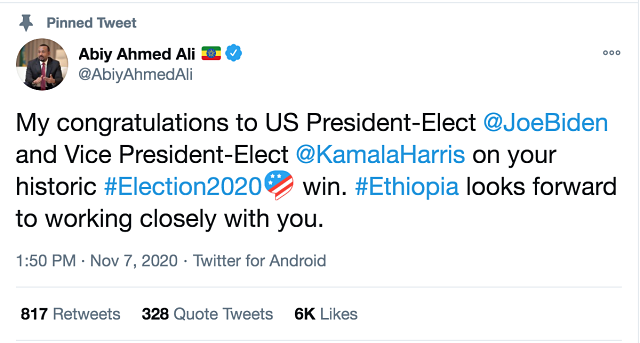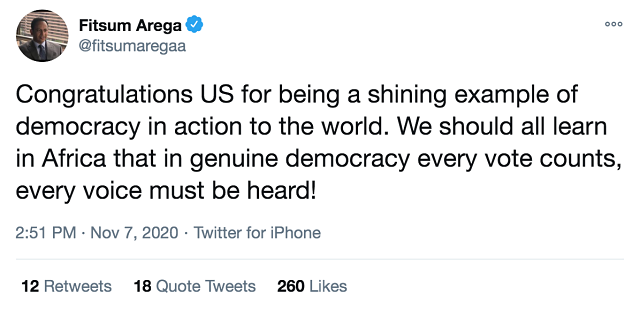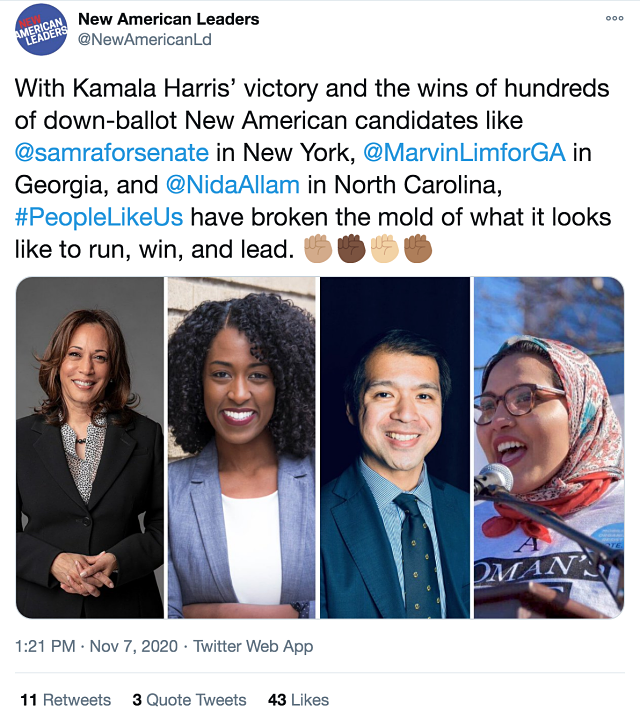The Associated Press
WASHINGTON (AP) — The Electoral College decisively confirmed Joe Biden on Monday as the nation’s next president, ratifying his November victory in an authoritative state-by-state repudiation of President Donald Trump’s refusal to concede he had lost.
The presidential electors gave Biden a solid majority of 306 electoral votes to Trump’s 232, the same margin that Trump bragged was a landslide when he won the White House four years ago.
Heightened security was in place in some states as electors met to cast paper ballots, with masks, social distancing and other pandemic precautions the order of the day. The results will be sent to Washington and tallied in a Jan. 6 joint session of Congress over which Vice President Mike Pence will preside.
For all Trump’s unsupported claims of fraud, there was little suspense and no change as every one of the electoral votes allocated to Biden and the president in last month’s popular vote went officially to each man. On Election Day, the Democrat topped the incumbent Republican by more than 7 million in the popular vote nationwide.
California’s 55 electoral votes put Biden over the top. Vermont, with 3 votes, was the first state to report. Hawaii, with 4 votes, was the last.
“Once again in America, the rule of law, our Constitution, and the will of the people have prevailed. Our democracy — pushed, tested, threatened — proved to be resilient, true, and strong,” Biden said in an evening speech in which he stressed the size of his win and the record 81 million people who voted for him.
He renewed his campaign promise to be a president for all Americans, whether they voted for him or not, and said the country has hard work ahead on the virus and economy.
But there was no concession from the White House, where Trump has continued to make unsupported allegations of fraud.
Trump remained in the Oval Office long after the sun set in Washington, calling allies and fellow Republicans while keeping track of the running Electoral College tally, according to White House and campaign aides. The president frequently ducked into the private dining room off the Oval Office to watch on TV, complaining that the cable networks were treating it like a mini-Election Night while not giving his challenges any airtime.
The president had grown increasingly disappointed with the size of “Stop the Steal” rallies across the nation as well as efforts for the GOP to field its own slates of electors in states. A presidential wish for a fierce administration defense led to TV appearances early Monday by Stephen Miller, one of his most ferocious advocates, to try to downplay the importance of the Electoral College vote and suggest that Trump’s legal challenges would continue all the way to Inauguration Day on Jan. 20.
Late in the day, he took to Twitter to announce that Attorney General William Barr was leaving the administration before Christmas. Barr’s departure comes amid lingering tension over Trump’s unsupported fraud claims, especially after Barr’s statement this month to The Associated Press that the election results were unaffected by any fraud.
In a Fox News interview taped over the weekend, Trump said that “I worry about the country having an illegitimate president, that’s what I worry about. A president that lost and lost badly.”
On Monday in Arizona, Georgia, Michigan, Nevada, Pennsylvania and Wisconsin — the six battleground states that Biden won and Trump contested — electors gave Biden and Vice President-elect Kamala Harris their votes in low-key proceedings. Nevada’s electors met via Zoom because of the coronavirus pandemic.
Trump’s efforts to undermine the election results also led to concerns about safety for the electors, virtually unheard of in previous years. In Michigan, lawmakers from both parties reported receiving threats, and legislative offices were closed over threats of violence. Biden won the state by 154,000 votes, or 2.8 percentage points, over Trump.
Georgia state police were out in force at the state Capitol in Atlanta before Democratic electors pledged to Biden met. There were no protesters seen.
Even with the Electoral College’s confirmation of Biden’s victory, some Republicans continued to refuse to acknowledge that reality. Yet their opposition to Biden had no practical effect on the electoral process, with the Democrat to be sworn in next month.
Republicans who would have been Trump electors met anyway in a handful of states Biden won. Pennsylvania Republicans said they cast a “procedural vote” for Trump and Pence in case courts that have repeatedly rejected challenges to Biden’s victory were to somehow still determine that Trump had won.
In North Carolina, Utah and other states across the country where Trump won, his electors turned out to duly cast their ballots for him. Electors in North Carolina had their temperatures checked before being allowed to enter the Capitol to vote. Utah Attorney General Sean Reyes withdrew as a Trump elector and was in quarantine because he was exposed to someone with COVID-19.
Former President Bill Clinton and former Secretary of State Hillary Clinton, whom Trump defeated four years ago, were among New York’s 29 electors for Biden and Harris.
In New Hampshire, before the state’s four electors voted for Biden at the State House in Concord, 13-year-old Brayden Harrington led the group in the Pledge of Allegiance. He had delivered a moving speech at the Democratic National Convention in August about the struggle with stuttering he shares with Biden.
Following weeks of Republican legal challenges that were easily dismissed by judges, Trump and Republican allies tried to persuade the Supreme Court last week to set aside 62 electoral votes for Biden in four states, which might have thrown the outcome into doubt.
The justices rejected the effort on Friday.
The Electoral College was the product of compromise during the drafting of the Constitution between those who favored electing the president by popular vote and those who opposed giving the people the power to directly choose their leader.
Each state gets a number of electors equal to its total number of seats in Congress: two senators plus however many members the state has in the House of Representatives. Washington, D.C., has three votes, under a constitutional amendment that was ratified in 1961. With the exception of Maine and Nebraska, states award all their Electoral College votes to the winner of the popular vote in their state.
—
Related:
Biden Taps Former Obama Official Susan Rice as Top Domestic Policy Adviser
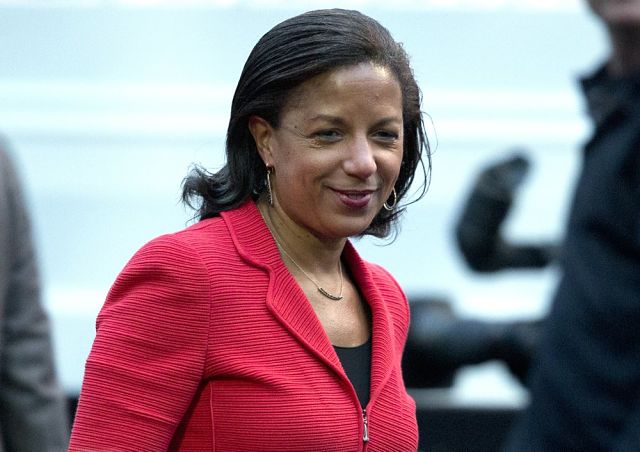
President-elect Joe Biden is naming Obama’s former national security adviser Susan E. Rice to serve as his top Domestic Policy adviser. As Ethiopian Americans we are as much interested in U.S. domestic policy that directly affects our lives here in America as we are about U.S. foreign policy towards Ethiopia. So it’s encouraging to see that as AP reports in choosing Rice, Biden is “signaling the importance of domestic policy in his early agenda” including immigration, heath care, education and racial justice. (AP photo)
The Associated Press
President-elect Joe Biden is naming Susan Rice as director of the White House Domestic Policy Council, giving her broad sway over his administration’s approach to immigration, health care and racial inequality and elevating the prominence of the position in the West Wing.
The move marks a surprising shift for Rice, a longtime Democratic foreign policy expert who served as President Barack Obama’s national security adviser and U.N. ambassador. She worked closely with then-Vice President Biden in those roles and was on his short list to become his running mate during the 2020 campaign.
Biden is also nominating Denis McDonough, who was Obama’s White House chief of staff, as secretary of the Department of Veterans Affairs, a sprawling agency that has presented organizational challenges for both parties over the years. But he never served in the armed forces, a fact noted by a leading veterans organization.
In selecting Rice and McDonough, Biden is continuing to stockpile his administration with prominent members of the Obama administration. He will make the formal announcements Friday, along with his nominations of Ohio Rep. Marcia Fudge to run the Department of Housing and Urban Development, Katherine Tai as U.S. trade representative and Tom Vilsack as agriculture secretary. Vilsack filled that same role during Obama’s two terms.
“The roles they will take on are where the rubber meets the road — where competent and crisis-tested governance can make a meaningful difference in people’s lives, enhancing the dignity, equity, security, and prosperity of the day-to-day lives of Americans,” Biden said in a statement.
In choosing Rice to oversee the White House council, advisers said Biden is signaling the importance of domestic policy in his early agenda.
Rice is expected to be more of a force, both inside and outside the White House, and her appointment creates a new power center in the West Wing. She’s discussed replicating some elements of the National Security Council in her new role, including a principals committee of Cabinet secretaries and others that could bring more structure to domestic policymaking, but also pull more power into the West Wing.
She’s expected to play an active role in the Biden administration’s response to the coronavirus pandemic. Health care, immigration and tackling racial inequality are also expected to be among the top issues for the domestic policy shop next year.
The 56-year-old Rice will be among the most prominent Black women in Biden’s administration. Rice was also in the running to become Biden’s running mate before he picked California Sen. Kamala Harris.
Since then, Rice has been discussing other roles with the Biden team and was initially seen as a contender for secretary of state. But as a longtime target of Republicans, her prospects for a Cabinet position faded after the election, given the close makeup of the Senate. A pair of runoffs in Georgia next month will determine which party has control, but either configuration will be exceedingly close.
Rice’s role overseeing the council does not require Senate confirmation.
Although Biden has insisted his administration will not simply be a retread of Obama’s presidency, he is bringing back numerous familiar faces. His team has defended the moves as a nod toward experience and the need to hit the ground running in tackling the pressing issues facing the nation across multiple fronts.
Shirley Anne Warshaw, a professor at Gettysburg College who has studied the presidency and Cabinets, said following Obama as he builds out his team gives Biden an advantage.
“This is a much better bench than Obama had because these people have the experience of serving in the Obama administration,” Warshaw said. “In that way, Joe Biden is the luckiest man in the world.”
McDonough, the VA nominee, is an experienced manager who was chief of staff throughout Obama’s second term. McDonough was previously Obama’s deputy national security adviser, including during the Navy SEAL raid in 2011 that killed al-Qaida leader Osama bin Laden, and was a longtime congressional staffer.
McDonough was credited with helping Obama try to bridge divides on Capitol Hill, including around one of his most substantial second-term legislative achievements: the Veterans Choice Act. The legislation, for which President Donald Trump tries to take credit, gave former service members more options to seek care and the VA secretary more authority to fire underperforming staffers.
The bill came about following exposes during the Obama administration into mismanagement at some VA hospitals and mounting complaints by advocacy groups. As chief of staff, McDonough was also deeply involved in an overhaul of VA leadership after the scandals, which led to the ouster of the department’s secretary.
“We are surprised by this pick. No way to deny that,” said Joe Chenelly, national executive director of AMVETS, or American Veterans. “We were expecting a veteran, maybe a post-9/11 veteran. Maybe a woman veteran. Or maybe a veteran who knows the VA exceptionally well. We are looking forward to hearing from President-Elect Biden on his thinking behind this nomination.”
McDonough’s wife, Kari, co-founded the nonprofit group Vets’ Community Connections, which helps veterans and their families develop stronger ties to their communities.
Biden is balancing numerous priorities as he fills out his Cabinet, including making good on his pledge to have a diverse group of top advisers. That’s created some tensions over top jobs, including agriculture secretary.
Allies of Fudge made no secret of their desire for her to lead the department, given its oversight of food stamps and other programs meant to address food insecurity — one of her longtime priorities. Instead, Biden went with Vilsack, a longtime friend and advocate for Democrats paying more attention to rural America.
A transition official said Vilsack and Fudge spoke Wednesday to lay the groundwork for cooperation between their two agencies on those and other initiatives.
—
Related:
Biden picks Lloyd Austin as secretary of defense
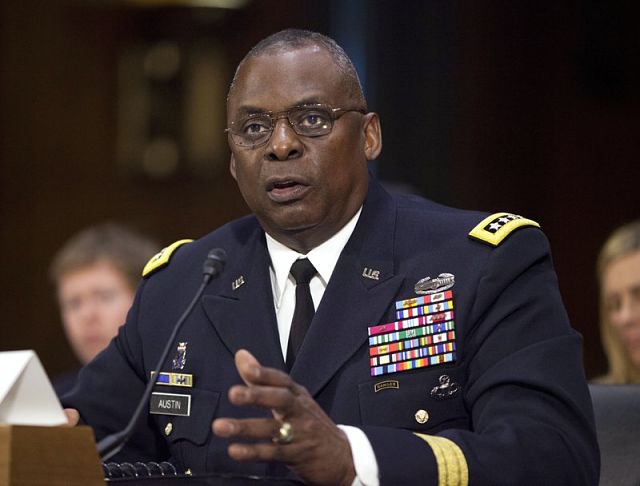
President-elect Joe Biden will nominate retired four-star Army general Lloyd J. Austin to be secretary of defense, according to four people familiar with the decision. If confirmed by the Senate, Austin would be the first Black leader of the Pentagon. (AP photo)
The Associated Press
President-elect Joe Biden will nominate retired four-star Army general Lloyd J. Austin to be secretary of defense, according to four people familiar with the decision. If confirmed by the Senate, Austin would be the first Black leader of the Pentagon.
Biden selected Austin over the longtime front-runner candidate, Michele Flournoy, a former senior Pentagon official and Biden supporter who would have been the first woman to serve as defense secretary. Biden also had considered Jeh Johnson, a former Pentagon general counsel and former secretary of homeland defense.
The impending nomination of Austin was confirmed by four people with knowledge of the pick who spoke to The Associated Press on condition of anonymity because the selection hadn’t been formally announced. Biden offered and Austin accepted the post on Sunday, according to a person familiar with the process.
As a career military officer, the 67-year-old Austin is likely to face opposition from some in Congress and in the defense establishment who believe in drawing a clear line between civilian and military leadership of the Pentagon. Although many previous defense secretaries have served briefly in the military, only two — George C. Marshall and James Mattis — have been career officers. Marshall also served as secretary of state.
Like Mattis, Austin would need to obtain a congressional waiver to serve as defense secretary. Congress intended civilian control of the military when it created the position of secretary of defense in 1947 and prohibited a recently retired military officer from holding the position.
One of the people who confirmed the pick said Austin’s selection was about choosing the best possible person but acknowledged that pressure had built to name a candidate of color and that Austin’s stock had risen in recent days.
Austin is a 1975 graduate of the U.S. Military Academy at West Point and served 41 years in uniform.
Biden has known Austin at least since the general’s years leading U.S. and coalition troops in Iraq while Biden was vice president. Austin was commander in Baghdad of the Multinational Corps-Iraq in 2008 when Barack Obama was elected president, and he returned to lead U.S. troops from 2010 through 2011.
Austin also served in 2012 as the first Black vice chief of staff of the Army, the service’s No. 2-ranking position. A year later he assumed command of U.S. Central Command, where he fashioned and began implementing a U.S. military strategy for rolling back the Islamic State militants in Iraq and Syria.
Austin retired from the Army in 2016, and he would need a congressional waiver of the legal requirement that a former member of the military be out of uniform at least seven years before serving as secretary of defense. That waiver has been granted only twice — most recently in the case of Mattis, the retired Marine general who served as President Donald Trump’s first Pentagon chief.
The Mattis period at the Pentagon is now viewed by some as evidence of why a recently retired military officer should serve as defense secretary only in rare exceptions. Although Mattis remains widely respected for his military prowess and intellect, critics say he tended to surround himself with military officers at the expense of a broader civilian perspective. He resigned in December 2018 in protest of Trump’s policies.
Loren DeJonge Schulman, who spent 10 years in senior staff positions at the Pentagon and the National Security Council, said she understands why Biden would seek out candidates with a deep understanding of the military. However, she worries that appointing a general to a political role could prolong some of the damage caused by Trump’s politicization of the military.
“But retired generals are not one-for-one substitutes of civilian leaders,” she said. “General officers bring different skills and different perspectives, and great generals do not universally make good appointees.”
Austin has a reputation for strong leadership, integrity and a sharp intellect. He would not be a prototypical defense secretary, not just because of his 41-year military career but also because he has shied from the public eye. It would be an understatement to say he was a quiet general; although he testified before Congress, he gave few interviews and preferred not to speak publicly about military operations.
When he did speak, Austin did not mince words. In 2015, in describing how the Islamic State army managed a year earlier to sweep across the Syrian border to grab control of large swaths of northern and western Iraq, Austin said the majority of Iraqi Sunnis simply refused to fight for their government.
“They allowed — and in some cases facilitated — ISIS’s push through the country,” Austin said.
He earned the admiration of the Obama administration for his work in Iraq and at Central Command, although he disagreed with Obama’s decision to pull out of Iraq entirely in December 2011.
Austin was involved in the Iraq War from start to finish. He served as an assistant commander of the 3rd Infantry Division during the invasion of Iraq in March 2003 and oversaw the withdrawal in 2011. When Austin retired in 2016, Obama praised his “character and competence,” as well as his judgment and leadership.
One person familiar with the matter said Biden was drawn to Austin’s oversight of the Iraq pull-out, especially given the military’s upcoming role in supporting the distribution of the coronavirus vaccines.
Like many retired generals, Austin has served on corporate boards. He is a member of the board of directors of Raytheon Technologies.
Word of Austin’s selection broke a day before a meeting between Biden and Vice President-elect Kamala Harris and civil rights groups, many of whom had pushed the president-elect to pick more Black Cabinet members.
The Rev. Al Sharpton, the civil rights activist, said Monday: “It’s a good choice that I think many in the civil rights community would support. It’s the first time we have seen a person of color in that position. That means something, in a global view, especially after such an antagonistic relationship we had with the previous administration.”
Sharpton, who is set to be in the meeting with Biden on Tuesday, called the choice “a step in the right direction but not the end of the walk.”
—
Biden Nominates Former Obama Official Antony Blinken as U.S. Secretary of State
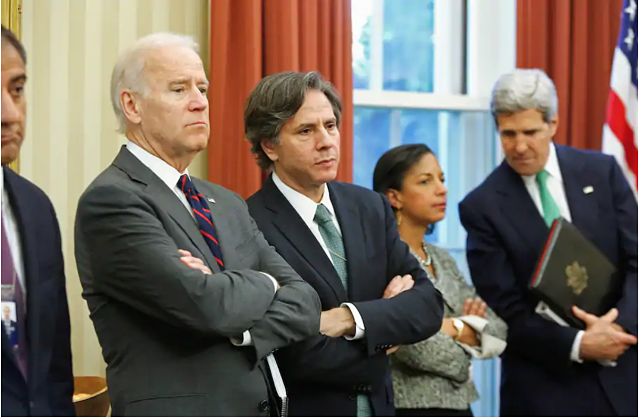
Antony Blinken (center) has weighed in publicly on notable foreign policy issues in Egypt and Ethiopia. Blinken, 58, served as deputy secretary of state and deputy national security adviser during the Obama administration and has close ties with Biden. (Photo: Biden with Tony Blinken, Susan Rice [Blinken’s former boss] and John F. Kerry listen as President Barack Obama addresses reporters in November 2013. /Reuters)
The Associated Press
Antony Blinken has weighed in publicly on notable foreign policy issues in Egypt and Ethiopia.
WASHINGTON (AP) — President-elect Joe Biden is expected to nominate Antony Blinken as secretary of state, according to multiple people familiar with the Biden team’s planning.
Blinken, 58, served as deputy secretary of state and deputy national security adviser during the Obama administration and has close ties with Biden. If nominated and confirmed, he would be a leading force in the incoming administration’s bid to reframe the U.S. relationship with the rest of the world after four years in which President Donald Trump questioned longtime alliances.
In nominating Blinken, Biden would sidestep potentially thorny issues that could have affected Senate confirmation for two other candidates on his short list to be America’s top diplomat: Susan Rice and Sen. Chris Coons.
Rice would have faced significant GOP opposition and likely rejection in the Senate. She has long been a target of Republicans, including for statements she made after the deadly 2012 attacks on Americans in Benghazi, Libya.
Coons’ departure from the Senate would have come as other Democratic senators are being considered for administrative posts and the party is hoping to win back the Senate. Control hangs on the result of two runoff elections in Georgia in January.
Biden is likely to name his Cabinet picks in tranches, with groups of nominees focused on a specific top area, like the economy, national security or public health, being announced at once. Advisers to the president-elect’s transition have said they’ll make their first Cabinet announcements on Tuesday.
If Biden focuses on national security that day, Michèle Flournoy, a veteran of Pentagon policy jobs, is a top choice to lead the Defense Department. Jake Sullivan, a longtime adviser to Biden and Hillary Clinton, is also in the mix for a top job, including White House national security adviser.
For his part, Blinken recently participated in a national security briefing with Biden and Vice President-elect Kamala Harris and has weighed in publicly on notable foreign policy issues in Egypt and Ethiopia.
Biden’s secretary of state would inherit a deeply demoralized and depleted career workforce at the State Department. Trump’s two secretaries of state, Rex Tillerson and Mike Pompeo, offered weak resistance to the administration’s attempts to gut the agency, which were thwarted only by congressional intervention.
Although the department escaped massive proposed cuts of more than 30% in its budget for three consecutive years, it has seen a significant number of departures from its senior and rising mid-level ranks, from which many diplomats have opted to retire or leave the foreign service given limited prospects for advancements under an administration that they believe does not value their expertise.
A graduate of Harvard University and Columbia Law School and a longtime Democratic foreign policy presence, Blinken has aligned himself with numerous former senior national security officials who have called for a major reinvestment in American diplomacy and renewed emphasis on global engagement.
“Democracy is in retreat around the world, and unfortunately it’s also in retreat at home because of the president taking a two-by-four to its institutions, its values and its people every day,” Blinken told The Associated Press in September. “Our friends know that Joe Biden knows who they are. So do our adversaries. That difference would be felt on day one.”
Blinken served on the National Security Council during the Clinton administration before becoming staff director for the Senate Foreign Relations Committee when Biden was chair of the panel. In the early years of the Obama administration, Blinken returned to the NSC and was then-Vice President Biden’s national security adviser before he moved to the State Department to serve as deputy to Secretary of State John Kerry.
Biden has pledged to build the most diverse government in modern history, and he and his team often speak about their desire for his administration to reflect America. He is being watched to see whether he will make history by nominating the first woman to lead the Pentagon, the Treasury Department or the Department of Veterans Affairs, or the first African American at the top of the Defense Department, the Interior Department or the Treasury Department.
Ron Klain, Biden’s incoming chief of staff, said Sunday the Trump administration’s refusal to clear the way for Biden’s team to have access to key information about agencies and federal dollars for the transition is taking its toll on planning, including the Cabinet selection process. Trump’s General Services Administration has yet to acknowledge that Biden won the election — a determination that would remove those roadblocks.
“We’re not in a position to get background checks on Cabinet nominees. And so there are definite impacts. Those impacts escalate every day,” Klain told ABC’s “This Week.”
Even some Republicans have broken with Trump in recent days and called on him to begin the transition. Joining the growing list were Sens. Kevin Cramer of North Dakota, Lamar Alexander of Tennessee, Pat Toomey of Pennsylvania and Lisa Murkowski of Alaska. Former Republican Gov. Chris Christie of New Jersey, a longtime Trump supporter, told ABC that it was time for the president to stop contesting the outcome and called Trump’s legal team seeking to overturn the election a “national embarrassment.”
Meanwhile, planning was underway for a pandemic-modified inauguration Jan. 20. Klain said the Biden team was consulting with Democratic leadership in the House and Senate over their plans.
“They’re going to try to have an inauguration that honors the importance and the symbolic meaning of the moment, but also does not result in the spread of the disease. That’s our goal,” Klain said.
—
Related:
Ethiopia Congratulates President-elect Joe Biden & VP-elect Kamala Harris
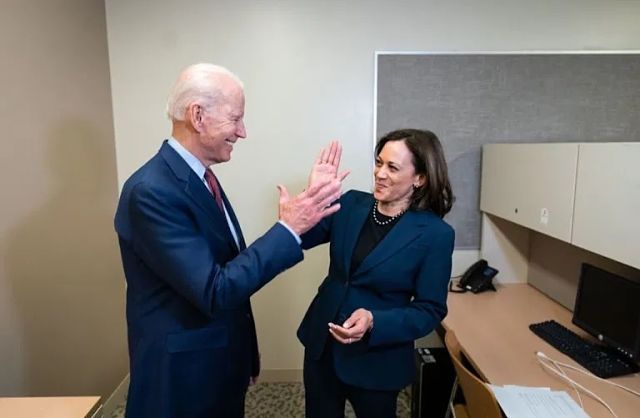
In a Twitter post Prime Minster Abiy Ahmed joined other world leaders in expressing his good wishes for the newly elected leadership in the United States. (Photo: Courtesy of the Biden Campaign)
Tadias Magazine
By Tadias Staff
Updated: November 9th, 2020
New York (TADIAS) — Ethiopia has congratulated President-elect Joe Biden and Vice President-elect Kamala Harris on their landmark U.S. election victory.
In a Twitter post on Saturday Prime Minster Abiy Ahmed joined other world leaders in expressing his good wishes for the newly elected leadership in the United States.
“My congratulations to US President-elect Joe Biden and and Vice President-Elect Kamala Harris on your historic election win,” PM Abiy wrote. “Ethiopia looks forward to working closely with you.”
Ethiopia’s ambassador to U.S. Fitsum Arega added: “Congratulations US for being a shining example of democracy in action to the world. We should all learn in Africa that in genuine democracy every vote counts, every voice must be heard!”
As USA Today noted: “International messages of congratulation started rolling in Saturday for U.S. President-elect Joe Biden after he was projected the winner of the presidential election over President Donald Trump. International allies contemplated a new White House that has raised the prospect of resuming a form of business as usual: a more fact-driven, multilateralist American presidency that wants to build bridges, not burn them.”
Related: ‘Welcome back, America’: World congratulates Joe Biden »
Watch: President-elect Joe Biden’s full acceptance speech
—
Ethio-American Samra Brouk Wins New York’s 55th Senate District
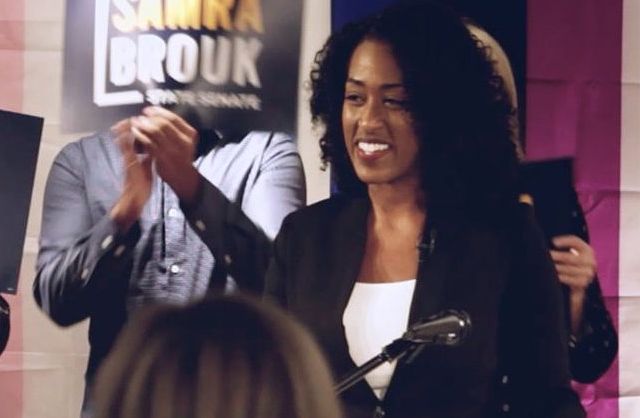
Samra Brouk, a daughter of Ethiopian immigrants, defeated Republican Christopher Missick becoming the first Black woman to win the seat that’s currently held by New York State Senator Rich Funke, who announced last year that he wouldn’t run for another term. (Courtesy photo)
Tadias Magazine
By Tadias Staff
Updated: November 8th, 2020
New York (TADIAS) — Democrat Samra Brouk has won the race for the New York State Senate’s 55th district, one of 63 districts in the New York State Senate.
Samra, a daughter of Ethiopian immigrants, defeated Republican Christopher Missick becoming the first Black woman to win the seat that’s currently held by New York State Senator Rich Funke, who announced last year that he wouldn’t run for another term.
The nonprofit organization New American Leaders, which recruits people of immigrant heritage to run for elected office in the United States, highlighted Samra in a social media post noting that “With Kamala Harris’ victory and the wins of hundreds of down-ballot New American candidates like Samra Brouk in New York, Marvin Lim in Georgia and Nida Allam in North Carolina, people like us have broken the mold of what it looks like to run, win, and lead.”
Samra who was born and raised in Rochester New York credits her parents — a public school teacher and a civil engineer — for her decision to go into public service. “My father fled his home country of Ethiopia during the civil war, overcoming major cultural and financial barriers to earn his degrees in math and engineering here in Western New York,” Samra states on her campaign website. “From my parents, I learned the importance of education, hard work, and the need to be resourceful when faced with obstacles.”
She adds:
As a high school student, I spoke out against unfair testing practices. While at Williams College, where I worked three jobs to pay my tuition, I organized a group volunteer trip to Biloxi, Mississippi. We did everything from removing mold from homes damaged by Hurricane Katrina to helping community clinics navigate FEMA in order to rebuild.
After graduating from Williams College with a Bachelors in Psychology and a minor in Spanish, I joined the U.S. Peace Corps where I volunteered in rural Guatemala as a health education specialist for two years. Upon returning home, like many of our young people, I was faced with limited job prospects. I was given an opportunity to help the Town of Brookhaven adopt a recycling education program for their population of nearly 500,000 people. I spent the following four years partnering with mayors and municipal leaders across the Northeast to adopt recycling education programs.
Following that, I joined the largest global member organization for young people, DoSomething.org, to mobilize millions of young people as social change advocates. Later, I helped start Umbrella, a start-up that used technology to keep seniors safe in their homes by connecting them with affordable and community-driven home care. Most recently, I drove fundraising efforts for Chalkbeat, the fastest growing grassroots journalism organization, supporting their work reporting on inequities in the public school system.
I currently live in Rochester, NY with my husband, Brian, who works with court-involved young people.
New York’s 55th Senate District is a sprawling geography–starting down in the Finger Lakes, up through Rush, Mendon, Pittsford, Perinton, Fairport, Penfield, East Rochester, Irondequoit, and the East Side of the City of Rochester.
My experiences around the state and the country have given me a broad perspective on what’s possible for our region. Now it’s time to bring all that I’ve learned and the relationships I’ve built to the community I love and call home.
Together we can create a more just, sustainable and inclusive community. Western New York is my forever home. It deserves real leadership.
Let’s do this!
Congratulations to Samra Brouk!
—
Oballa Oballa: Ethiopian Refugee Wins City Council Election in Austin, Minnesota
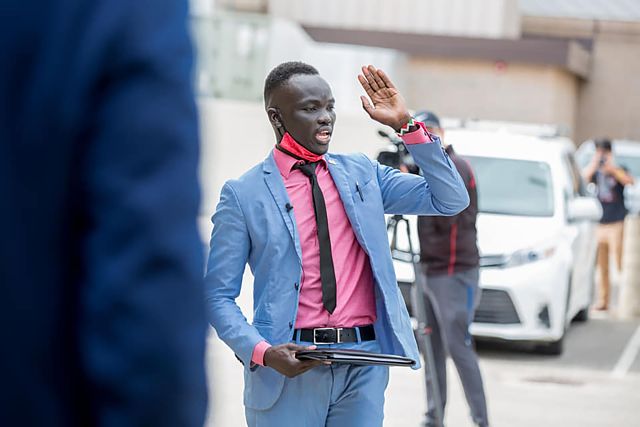
Soon after moving to Austin, Minnesota, Oballa Oballa [whose family fled Gambella, Ethiopia, in 2003] walked into the mayor’s office and asked if there was anything he could do for the city. He just became Austin’s first Black city council member. (Photo: Courtesy of Oballa Oballa)
Sahan Journal
Oballa Oballa, a refugee from Ethiopia, wins historic city council election in Austin; becomes city’s first Black elected official.
Oballa Oballa, a former refugee from Ethiopia who became a naturalized citizen less than one year ago, made history this election by winning a city council seat in the southeast Minnesota city of Austin.
As of Wednesday afternoon, Oballa, 27, held a 14 percent lead over candidate Helen Jahr and declared victory. Oballa, who had been campaigning for the seat since the beginning of the year, said he is the first person of color to win elected office in Austin.
On the campaign trail and in interviews, Oballa described a dramatic personal history. His family fled Gambella, Ethiopia, in 2003, following what he describes as a genocidal attack on his community. They spent the next 10 years living in Kenya’s Dadaab refugee camp. In 2013, the family moved to the U.S., and by 2015, Oballa had settled in Austin.
Oballa is just one example of how immigrant communities are shaping Minnesota politics well beyond the Twin Cities, and are now starting to win seats for public office. Oballa said his record of civic engagement earned him voters’ support.
“This makes me feel great, it makes me feel really happy and proud,” he said. “My work, I think, will still give hope to refugees who think the American dream is dead.”
He added, “Just seven years ago, [I] was living in a refugee camp and now am officially elected. I think that will give them hope that one day, when they come to America here, they will accomplish whatever they put their mind to.”
—-
BIDEN DEFEATS TRUMP! USA CELEBRATES
The Washington Post
Joe Biden triumphs over Trump, prompting celebration across the U.S. and congratulations from abroad
Joseph Robinette Biden Jr. was elected the nation’s 46th president Saturday in a repudiation of President Trump powered by legions of women and minority voters who rejected his handling of the coronavirus pandemic and his divisive, bullying conduct in office.
Biden’s victory, the culmination of four years of struggle for Democrats, came after a hotly contested election in which it took four days for a winner to be declared after the former vice president was projected to win a series of battleground states, the latest of which was the state where he was born, Pennsylvania.
Voters also made history in electing as vice president Kamala Devi Harris, 56, a senator from California and daughter of Jamaican and Indian immigrants who will become the country’s first woman, first Black person and first Asian American to hold the No. 2 job.
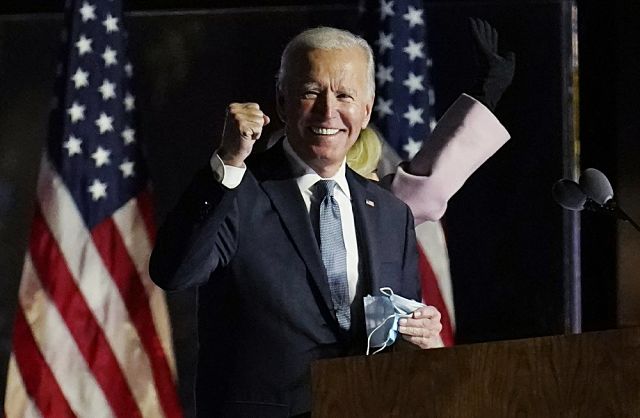
Joe Biden will become the 46th president of the United States after a victory in the state where he was born (Pennsylvania) put him over the 270 electoral votes needed to win. In New York City, spontaneous block parties broke out. People ran out of their buildings, banging on pots. They danced and high-fived with strangers amid honking horns. (AP photo)
In a statement released Saturday, Biden said he is “honored and humbled” to be the victor in an election in which “a record number of Americans voted.” He said he and Harris looked forward to working on the nation’s many challenges.
“With the campaign over, it’s time to put the anger and the harsh rhetoric behind us and come together as a nation,” Biden said in the statement, in which his campaign referred to him as “President-elect Joe Biden” for the first time. “It’s time for America to unite. And to heal. We are the United States of America. And there’s nothing we can’t do, if we do it together.”
WATCH LIVE: Biden’s win sparks street celebrations around the country
Harris, in a tweet sent after the result was announced, said the election was about more than the Democratic team.
“It’s about the soul of America and our willingness to fight for it,” she said. “We have a lot of work ahead of us. Let’s get started.”
—
Related:
Video: Tadias Panel Discussion on Civic Engagement and Voter Mobilization
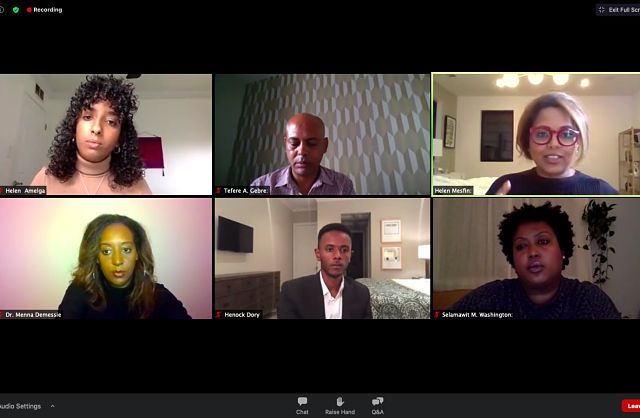
On Sunday, October 25th, Tadias Magazine hosted a timely virtual panel discussion on civic engagement and voter mobilization featuring a new generation of Ethiopian American leaders from various professions. You can watch the video below. (Photos: Tadias Magazine)
Tadias Magazine
By Tadias Staff
Updated: October 28th, 2020
New York (TADIAS) — The U.S. presidential election is only one week away and Tadias hosted a timely and lively discussion on building political power through civic engagement and voter mobilization on Sunday, October 25th featuring a new generation of Ethiopian American leaders from various professions. You can watch the video below.
Panelists included Henock Dory, who currently serves as Special Assistant to former President Barack Obama; Tefere Gebre, Executive Vice President of the AFL-CIO; Selam Mulugeta Washington, a former Field Organizer with Obama for America, Helen Mesfin from the Helen Show DC, Dr. Menna Demessie, Vice President of Policy Analysis & Research at the Congressional Black Caucus Foundation; Helen Amelga, President of the Ethiopian Democratic Club of Los Angeles (moderator) as well as Bemnet Meshesha and Helen Eshete of the Habeshas Vote initiative. The event opened with poetry reading by Bitaniya Giday, the 2020-2021 Seattle Youth Poet Laureate.
Ethiopian Americans are as diverse as mainstream America when it comes to our perspectives on various social and political issues, but despite our differences we are all united when it comes to the need to
empower ourselves and participate in the democratic process through our citizenship rights to vote and run for office.
So vote on November 3rd.
—
Related:
‘Habeshas Vote’ Phone Banking Event This Week Aims Outreach to Ethio-Americans

(Photo courtesy of Habesha Networks)
Tadias Magazine
By Tadias Staff
Published: October 19th, 2020
New York (TADIAS) — We are now almost two weeks away from the November 3rd U.S. presidential election. This week the ‘Habeshas Vote’ initiative and the non-profit organization Habesha Networks in partnership with Tadias Magazine and Abbay Media will host their first virtual phone banking event to reach out to the Ethiopian American community.
The online event, which is set to take place on Thursday, October 22nd from 7:00 PM – 9:00 PM EDT, will feature various panel discussions, public service announcements and cultural engagements.
Organizers note that there will be a brief training on phone banking as well as “some amazing prizes” for those that call and text the most voters.
If You Attend:
Click here to lean more and RSVP.
—-
Related:
Ethiopian-Americans for Biden-Harris Hosts Virtual Conversation
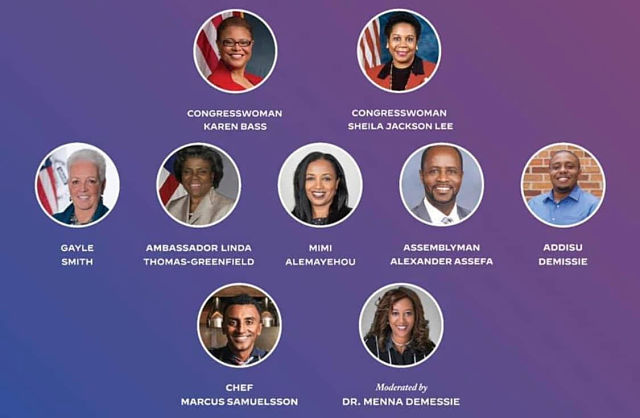
Ethiopian-Americans for Biden-Harris is a volunteer-led group that supports the candidacy of Former Vice-President Joe Biden and Senator Kamala Harris. (Courtesy photo)
Tadias Magazine
By Tadias Staff
Updated: October 19th, 2020
New York (TADIAS) — As the highly anticipated 2020 U.S. presidential election fast approaches on November 3rd, various Ethiopian American associations are organizing voter turnout and education events across the country.
The latest to announce such an event is the newly formed, volunteer-led group, Ethiopian-Americans for Biden-Harris, which supports the candidacy of Former Vice-President Joe Biden and Senator Kamala Harris and will be hosting an online conversation next week Friday, October 23 at 6:00 PM EDT/3:00 PM PDT.
“As one of the largest African Diaspora groups in the United States, the community has historically supported causes championed by the Democratic Party, including but not limited to, immigration reform, healthcare reform, promotion of democracy, human rights and improved trade and investment between the United States and Ethiopia,” the group states in its press release. “Ethiopian-Americans believe that a Biden-Harris Administration will champion equitable access and opportunity for all Americans, restore mutually beneficial relationships with Ethiopia and improve America’s standing among the community of nations.”
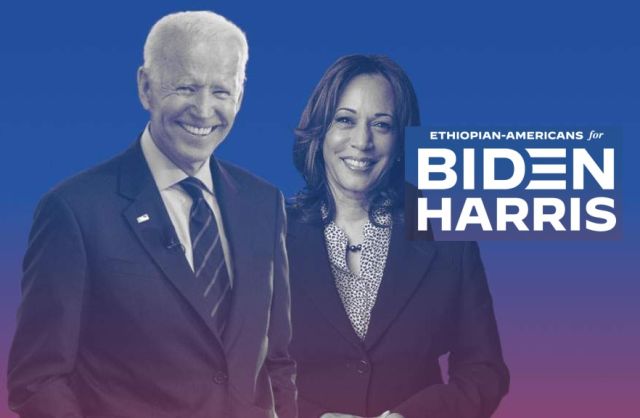
(Courtesy photo)
The virtual event, which will be moderated by Dr. Menna Demessie, Senior Vice President of Policy Analysis & Research at the Congressional Black Caucus Foundation, features Congresswoman Karen Bass, who has represented California’s 37th congressional district since 2013; Representative Sheila Jackson Lee of Texas; Gayle Smith, president and CEO of the One Campaign and the former administrator of the United States Agency for International Development; and Ambassador Linda Thomas-Greenfield, a Senior Vice President at Albright Stonebridge Group (ASG) leading the firm’s Africa practice. Thomas-Greenfield was also the Assistant Secretary of State for African Affairs in the United States Department of State’s Bureau of African Affairs from 2013 to 2017.
Ethiopian American speakers include Assemblyman Alexander Assefa, the first Ethiopian-American elected to public office in the United States and the first African immigrant to serve in elected office in the State of Nevada; Addisu Demissie, who served as Senior Advisor to U.S. presidential candidate Joe Biden, and was responsible for organizing the nominating convention for the Democratic Party this past summer; Marcus Samuelsson, an award-winning chef, restaurateur, cookbook author, philanthropist and food activist; Mimi Alemayehou, a development finance executive who has served as Executive Vice President of the U.S. Overseas Private Investment Corporation and as United States Executive Director of the African Development Bank.
—
If You Attend
Click here to RSVP now staring $25.
Learn more at www.ethiopiansforbidenharris.com.
—
Related:
Ethiopian Americans: Election is Approaching, Let’s Make Sure our Voices are Heard
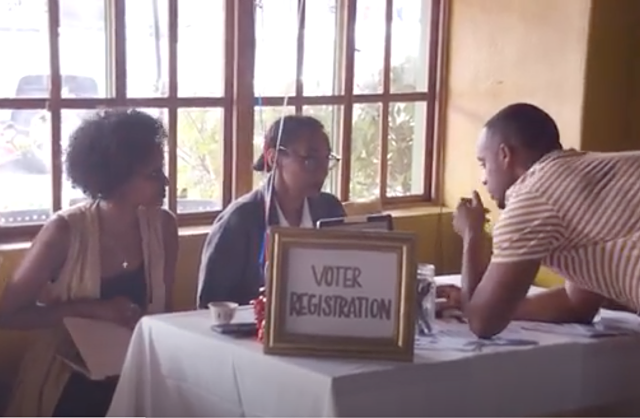
In this OP-ED Helen Amelga, President of the Ethiopian Democratic Club of Los Angeles, urges Ethiopian Americans to participate in the upcoming U.S. election that will directly impact our lives for many years to come, and shares resources to help our community to get involved in the democratic process. (Courtesy photo)
Tadias Magazine
By Helen Amelga

Updated: October 16th, 2020
Los Angeles (TADIAS) — How many people of Ethiopian descent live in the United States? 300,000? 400,000? 500,000? We don’t really know for sure. But with the 2020 census, we will for the first time have the opportunity to get a truly accurate count. If you haven’t done so already, go to 2020cencus.gov and complete your census today.
While the exact numbers are yet to be determined, it is clear that there is a significant Ethiopian-American population in the United States. Why is it then that we do not have a strong political presence?
We know our community can organize. We have Iqub (እቁብ), mahbers (ማህበር), business associations, and our faith based groups are extremely organized. We need to use those same skills to mobilize politically.
We must equip ourselves with the knowledge of political systems, major policies and voter rights, not only to serve as advocates for our community, but so that we ourselves can occupy positions of power and authority to be the decision makers who shape the society and world we want to live in.
We know it’s possible because we already have trailblazers such as Assemblyman Alexander Assefa, the first Ethiopian American to be elected into office in the Nevada Legislature and the first Ethiopian American ever elected in the U.S. to a state-wide governing body as well as Judge Nina Ashenafi Richardson of Florida, who is the first Ethiopian-American judge in the United States who was re-elected to a third term his year.
We cannot afford to give our vote away to candidates who are not serving our needs. We are ready to spring into action when there is a problem in our community, but it is not enough to go to our elected officials once we have a problem and try to convince them to help us. We need to be proactive.
We must purposefully engage to get the right people elected in the first place. We must identify candidates who align with and will fight for our values. Then, we must do everything we can to make sure those candidates are elected.
Here are a few steps you can take to get involved:
2. Request a vote by mail ballot today
3. Reach out to 5 friends and make sure they’re registered to vote
4. Research your candidates & ballot measures
5. Volunteers to phone bank for a campaign
6. Sign up to be a poll worker on election day
The November 3rd general election is fast approaching. Let’s make sure our voices are heard.
—
Related:
Interview: Helen Amelga, Founder of Ethiopian Democratic Club of LA
Interview With Addisu Demissie: Senior Adviser to Joe Biden
Biden Selects Yohannes Abraham as Member of Transition Team
—
Related:
Election 2020 – The Youth Vote Event In Seattle
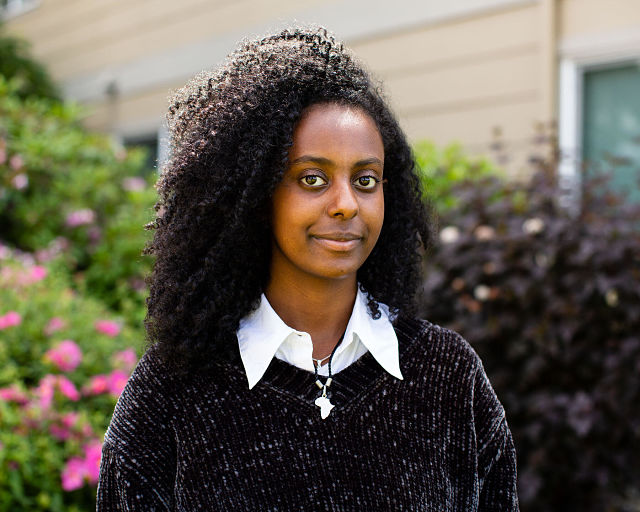
Bitaniya Giday, age 17, is the 2020-2021 Seattle Youth Poet Laureate. She is a first-generation Ethiopian American residing in Seattle. Bitaniya is one of the young interviewers in a timely upcoming Zoom event on October 14th titled “The Youth Vote: A conversation about leadership, ethics and values and how they factor into choosing a candidate.” (KNKX PUBLIC RADIO)
KNKX PUBLIC RADIO
Young people make up a projected 37% of the 2020 electorate, yet historically they vote less than other age groups. Will it be different this time? The pandemic crisis and the call for racial justice and institutional changes are top concerns as we move closer to this high stakes election. Ethics and values also underpin our decisions. This virtual event aims to bring together first-time and new voters with older adults with a track record of civic leadership to discuss a number of issues through the lens of beliefs and values, touching on things like:
What does it mean to be a leader?
In thorny situations, how do you speak for a community?
If there are three important issues facing your community and you only have enough resources to address one, how would you choose?
Because this is leading up to the general election, we want to frame this conversation around the power to change systems for the greater good and how that ties in with being an informed voter.
The six young interviewers will ask the four speakers questions relating to the themes of conflict/failure, challenges, accountability, transparency, priorities and representation, with the speakers drawing on their personal and professional experiences; and offering examples of how they have faced challenging situations and how that speaks to leadership and community building.
Young Interviewers
Bitaniya Giday, age 17, is the 2020-2021 Seattle Youth Poet Laureate. She is a first-generation Ethiopian American residing in Seattle. Her writing explores the nuances of womanhood and blackness, as she reflects upon her family’s path of immigration across the world. She hopes to restore and safeguard the past, present, and future histories of her people through traditional storytelling and poetry.
—
Related:
Ethiopian Americans Hold Virtual Town Hall Ahead of November Election
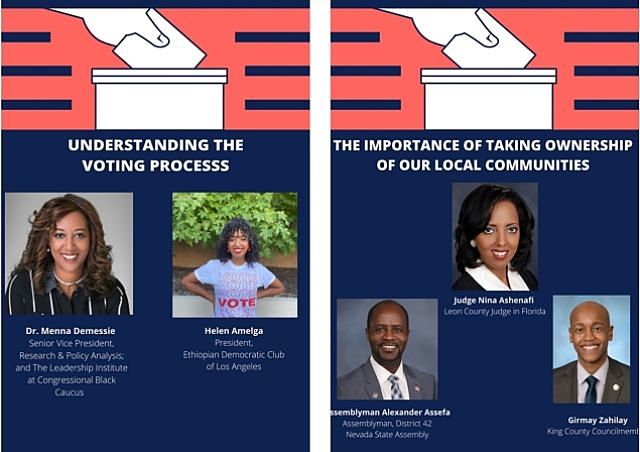
The nationwide town hall event, which will be held on Thursday, September 24th, 2020 plans to emphasize the importance of exercising our citizenship right to vote and to participate in the U.S. democratic process. The gathering will feature panel discussions, PSAs, and cultural engagements. (Courtesy photos)
Tadias Magazine
By Tadias Staff
Updated: September 23rd, 2020
Los Angeles (TADIAS) — Ethiopian Americans are holding a virtual town hall this week ahead of the November 3rd U.S. election.
The nationwide event, which will be held on Thursday, September 24th, will emphasize the importance of exercising our citizenship right to vote and to participate in the U.S. democratic process.
According to organizers the town hall — put together by the ‘Habeshas Vote’ initiative and the non-profit organization Habesha Networks — will feature various panel discussions, public service announcements and cultural engagements.
“We intend on discussing various subject matters related to civic engagement issues affecting our community at the moment,” the announcement notes, highlighting that by the end of the conference “participants will be able to understand the importance of taking ownership of our local communities, learn more about the voting process and gain a better [appreciation] of why we should all care about voting.”
Speakers include Helen Amelga, President of the Ethiopian Democratic Club of Los Angeles; Dr. Menna Demissie, Senior Vice President of Policy Analysis & Research at the Congressional Black Caucus Foundation; Assemblyman Alexander Assefa, the first Ethiopian American to be elected into office in the Nevada Legislature and the first Ethiopian American ever elected in the U.S. to a state-wide governing body; Judge Nina Ashenafi Richardson of Florida, who is the first Ethiopian-American judge in the United States who was re-elected to a third term this year; and Girmay Zahilay, Councilman in King County, Washington.

(Courtesy photos)
Additional presenters include: Andom Ghebreghiorgis. former Congressional candidate from New York; Samuel Gebru, former candidate for City Council in Cambridge, Massachusetts, and current managing director of Black Lion Strategies; as well as Hannah Joy Gebresilassie, journalist and community advocate; and Debbie Almraw, writer and poet.
Entertainment will be provided by Elias Aragaw, the artist behind @TheFunkIsReal, and DJ Sammy Sam.
The announcement notes that “voting is a core principle of being American, but to exercise this basic right we must be registered to vote! That’s why Habesha Networks and Habeshas Vote are proud partners of When We All Vote and supporters of National Voter Registration Day.”
—
Watch: Students Interview Kamala Harris (U.S. ELECTION UPDATE)
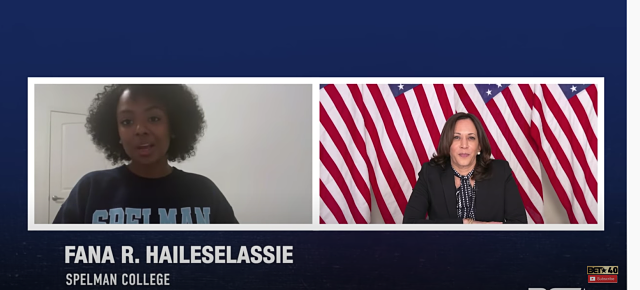
Fana R. Haileselassie, a student at Spelman College in Atlanta, asks Sen. Kamala Harris a question during a virtual Q&A hosted by BET featuring the Democratic nominee for Vice President and students discussing the interests of millennial voters. (Photo: BETNetworks)
BET News Special
HBCU Students Interview Kamala Harris
A virtual Q&A hosted by Terrence J featuring Democratic nominee for Vice President Sen. Kamala Harris and HBCU students discussing the interests of millennial voters.
Watch: Sen. Kamala Harris Answers HBCU Students’ Questions About Voting, Student Loan Debt & More
—
Related:
Virginia’s Era as a Swing State Appears to be Over
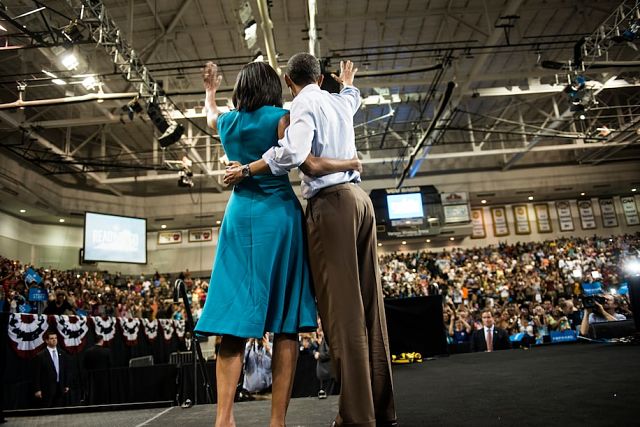
President Barack Obama and first lady Michelle Obama wave after a campaign event in May 2012 in Richmond. (Getty Images)
The Washington Post
Updated: September 18th, 2020
No TV ads, no presidential visits: Virginia’s era as a swing state appears to be over
Barack Obama held the very last rally of his 2008 campaign in Virginia, the longtime Republican stronghold he flipped on his way to the White House.
Four years later, Obama and Republican challenger Mitt Romney made more visits and aired more television ads here than nearly anywhere else. And in 2016, Donald Trump staged rally after rally in the Old Dominion while Hillary Clinton picked a Virginian as her running mate.
But Virginia isn’t getting the swing-state treatment this time around. As in-person early voting got underway Friday, President Trump and Democratic challenger Joe Biden were dark on broadcast television. Super PACs were clogging somebody else’s airwaves. Even as Trump and Biden have resumed limited travel amid the coronavirus pandemic, neither has stumped in the Old Dominion.
There’s really no discussion about the state being in play,” said Amy Walter, national editor of the nonpartisan Cook Political Report. “If you’re Ohio or New Hampshire, or Wisconsin, Pennsylvania, you’ve always been in that spotlight. Virginia got it for such a short period of time.”
The last time presidential candidates stayed out of Virginia and off its airwaves was 2004. The state was reliably red then, having backed Republicans for the White House every year since 1968. Now Virginia seems to be getting the cold shoulder because it’s considered solidly blue.
“Virginia was the belle of the ball in 2008, and again in 2012, and still once more in 2016, but in 2020, the commonwealth is a wall flower,” said Stephen Farnsworth, a University of Mary Washington political scientist.
—
Related:
Virginians come out in force to cast ballots on the first day of early voting
Mike Bloomberg to spend at least $100 million in Florida to benefit Joe Biden
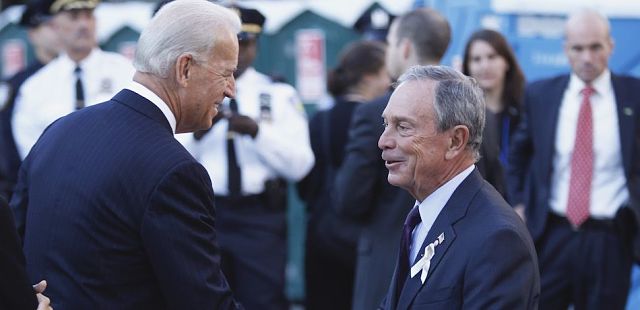
Former NYC mayor Mike Bloomberg plans to spend at least $100 million to help elect Joe Biden, a massive late-stage infusion of cash that could reshape the presidential contest. (Getty Images)
The Washington Post
Updated: September 13th, 2020
Former New York mayor Mike Bloomberg plans to spend at least $100 million in Florida to help elect Democrat Joe Biden, a massive late-stage infusion of cash that could reshape the presidential contest in a costly toss-up state central to President Trump’s reelection hopes.
Bloomberg made the decision to focus his final election spending on Florida last week, after news reports that Trump had considered spending as much as $100 million of his own money in the final weeks of the campaign, Bloomberg’s advisers said. Presented with several options on how to make good on an earlier promise to help elect Biden, Bloomberg decided that a narrow focus on Florida was the best use of his money.
The president’s campaign has long treated the state, which Trump now calls home, as a top priority, and his advisers remain confident in his chances given strong turnout in 2016 and 2018 that gave Republicans narrow winning margins in statewide contests.
Watch: Former 2020 presidential candidate Mike Bloomberg slammed Trump during his Democratic National Convention speech on Aug. 20.
Bloomberg’s aim is to prompt enough early voting that a pro-Biden result would be evident soon after the polls close.
—
Related:
Biden Leads by 9 Percentage Points in Pennsylvania (ELECTION UPDATE)

In the survey, Biden, who was born in the state, draws the support of 53 percent of likely voters, compared to 44 percent who back Trump. (Reuters photo)
The Washington Post
Updated: September 9, 2020
Biden Leads by 9 Percentage Points in Pennsylvania, Poll Finds
Joe Biden leads President Trump by nine percentage points among likely voters in Pennsylvania, a key battleground state that Trump narrowly won four years ago, according to a new NBC News-Marist poll.
In the survey, Biden, who was born in the state, draws the support of 53 percent of likely voters, compared to 44 percent who back Trump.
In 2016, Trump carried Pennsylvania by less than one percentage point over Democrat Hillary Clinton.
The NBC-Marist poll shows Biden getting a boost from suburban voters, who side with him by nearly 20 percentage points, 58 percent to 39 percent. In 2016, Trump won suburban voters in Pennsylvania by about eight points, according to exit polls.
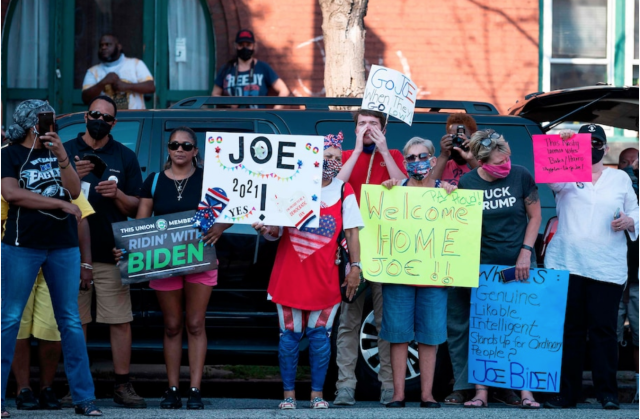
Supporters of Democratic presidential candidate Joe Biden stand outside the AFL-CIO headquarters in Harrisburg, Pa., on Monday. (Getty Images)
The poll also finds the candidates are tied at 49 percent among white voters in Pennsylvania, a group that Trump won by double digits in 2016. Biden leads Trump among nonwhite voters, 75 percent to 19 percent.
Pennsylvania has been a frequent destination for both campaigns in recent weeks. Vice President Pence has events scheduled there on Wednesday.
—
Kamala D. Harris Goes Viral — for Her Shoe Choice
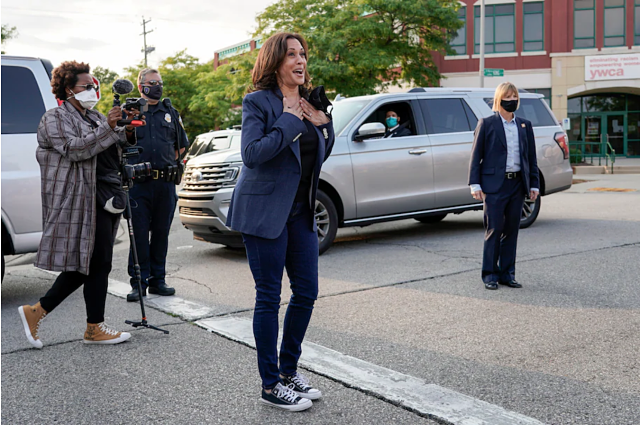
Sporting Chuck Taylor sneakers, Democratic vice-presidential candidate Sen. Kamala D. Harris (Calif.) greets supporters Monday in Milwaukee. (AP photo)
The Washington Post
Updated: September 8, 2020
It took roughly eight seconds of on-the-ground campaigning for the first Black woman to be nominated on a major party’s ticket to go viral.
At first glance, little seemed noteworthy as Sen. Kamala D. Harris deplaned in Milwaukee on Monday. She was wearing a mask. She didn’t trip. Instead, what sent video pinging around the Internet was what was on her feet: her black, low-rise Chuck Taylor All-Stars, the classic Converse shoe that has long been associated more closely with cultural cool than carefully managed high-profile candidacies.
By Tuesday morning, videos by two reporters witnessing her arrival had been viewed nearly 8 million times on Twitter — for comparison’s sake, more than four times the attention the campaign’s biggest planned video event, a conversation between Joe Biden and Barack Obama, had received on both Twitter and YouTube combined.
Harris’s sister, Maya, tweeted Monday that Chuck Taylors are, indeed, her sister’s “go-to.” A few hours later, Harris’s official campaign account tweeted the video with the caption “laced up and ready to win.”
Read more »
—
81 American Nobel Laureates Endorse Biden for Next U.S. President
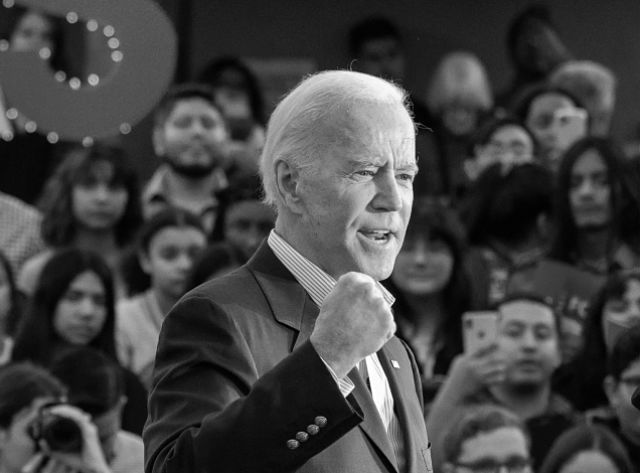
The Nobel laureates in physics, chemistry and medicine “wholeheartedly” endorsed the Democratic nominee in an open letter released Wednesday. “At no time in our nation’s history has there been a greater need for our leaders to appreciate the value of science in formulating public policy,” they said. (Courtesy photo)
Press Release
Nobel Laureates endorse Joe Biden
81 American Nobel Laureates in Physics, Chemistry, and Medicine have signed this letter to express their support for former Vice President Joe Biden in the 2020 election for President of the United States.
At no time in our nation’s history has there been a greater need for our leaders to appreciate the value of science in formulating public policy. During his long record of public service, Joe Biden has consistently demonstrated his willingness to listen to experts, his understanding of the value of international collaboration in research, and his respect for the contribution that immigrants make to the intellectual life of our country.
As American citizens and as scientists, we wholeheartedly endorse Joe Biden for President.
Name, Category, Prize Year:
Peter Agre Chemistry 2003
Sidney Altman Chemistry 1989
Frances H. Arnold Chemistry 2018
Paul Berg Chemistry 1980
Thomas R. Cech Chemistry 1989
Martin Chalfie Chemistry 2008
Elias James Corey Chemistry 1990
Joachim Frank Chemistry 2017
Walter Gilbert Chemistry 1980
John B. Goodenough Chemistry 2019
Alan Heeger Chemistry 2000
Dudley R. Herschbach Chemistry 1986
Roald Hoffmann Chemistry 1981
Brian K. Kobilka Chemistry 2012
Roger D. Kornberg Chemistry 2006
Robert J. Lefkowitz Chemistry 2012
Roderick MacKinnon Chemistry 2003
Paul L. Modrich Chemistry 2015
William E. Moerner Chemistry 2014
Mario J. Molina Chemistry 1995
Richard R. Schrock Chemistry 2005
K. Barry Sharpless Chemistry 2001
Sir James Fraser Stoddart Chemistry 2016
M. Stanley Whittingham Chemistry 2019
James P. Allison Medicine 2018
Richard Axel Medicine 2004
David Baltimore Medicine 1975
J. Michael Bishop Medicine 1989
Elizabeth H. Blackburn Medicine 2009
Michael S. Brown Medicine 1985
Linda B. Buck Medicine 2004
Mario R. Capecchi Medicine 2007
Edmond H. Fischer Medicine 1992
Joseph L. Goldstein Medicine 1985
Carol W. Greider Medicine 2009
Jeffrey Connor Hall Medicine 2017
Leland H. Hartwell Medicine 2001
H. Robert Horvitz Medicine 2002
Louis J. Ignarro Medicine 1998
William G. Kaelin Jr. Medicine 2019
Eric R. Kandel Medicine 2000
Craig C. Mello Medicine 2006
John O’Keefe Medicine 2014
Michael Rosbash Medicine 2017
James E. Rothman Medicine 2013
Randy W. Schekman Medicine 2013
Gregg L. Semenza Medicine 2019
Hamilton O. Smith Medicine 1978
Thomas C. Sudhof Medicine 2013
Jack W. Szostak Medicine 2009
Susumu Tonegawa Medicine 1987
Harold E. Varmus Medicine 1989
Eric F. Wieschaus Medicine 1995
Torsten N. Wiesel Medicine 1981
Michael W. Young Medicine 2017
Barry Clark Barish Physics 2017
Steven Chu Physics 1997
Jerome I. Friedman Physics 1990
Sheldon Glashow Physics 1979
David J. Gross Physics 2004
John L. Hall Physics 2005
Wolfgang Ketterle Physics 2001
J. Michael Kosterlitz Physics 2016
Herbert Kroemer Physics 2000
Robert B. Laughlin Physics 1998
Anthony J. Leggett Physics 2003
John C. Mather Physics 2006
Shuji Nakamura Physics 2014
Douglas D. Osheroff Physics 1996
James Peebles Physics 2019
Arno Penzias Physics 1978
Saul Perlmutter Physics 2011
H. David Politzer Physics 2004
Brian P. Schmidt Physics 2011
Joseph H. Taylor Jr. Physics 1993
Kip Stephen Thorne Physics 2017
Daniel C. Tsui Physics 1998
Rainer Weiss Physics 2017
Frank Wilczek Physics 2004
Robert Woodrow Wilson Physics 1978
David J. Wineland Physics 2012
—
Related
Biden Calls Trump ‘a Toxic Presence’ Who is Encouraging Violence in America
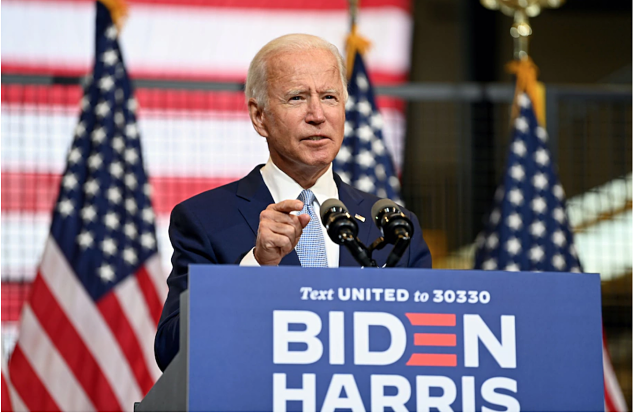
“Donald Trump has been a toxic presence in our nation for four years,” Biden said. “Will we rid ourselves of this toxin? (Photo: Joe Biden speaks Monday in Pittsburgh/Reuters)
The Washington Post
Joe Biden excoriated President Trump on Monday as a threat to the safety of all Americans, saying he has encouraged violence in the nation’s streets even as he has faltered in handling the coronavirus pandemic.
For his most extensive remarks since violent protests have escalated across the country in recent days, Biden traveled to Pittsburgh and struck a centrist note, condemning both the destruction in the streets and Trump for creating a culture that he said has exacerbated it.
“I want to be very clear about all of this: Rioting is not protesting. Looting is not protesting. Setting fires is not protesting,” Biden said. “It’s lawlessness, plain and simple. And those who do it should be prosecuted.”
The former vice president also rejected the caricature that Trump and his allies have painted of him as someone who holds extremist views and has helped fuel the anger in urban centers across the country.
“You know me. You know my heart. You know my story, my family’s story,” Biden said. “Ask yourself: Do I look like a radical socialist with a soft spot for rioters? Really?”
While the speech was delivered amid heightened tensions over race and police conduct, Biden did not outline new policies, instead focusing on making a broader condemnation of Trump.
He called the president a danger to those suffering from the coronavirus, to anyone in search of a job or struggling to pay rent, to voters worried about Russian interference in the upcoming election and to those worried about their own safety amid unrest.
“Donald Trump wants to ask the question: Who will keep you safer as president? Let’s answer that question,” Biden said. “When I was vice president, violent crime fell 15 percent in this country. We did it without chaos and disorder.”
Pointing to a nationwide homicide rate rising 26 percent this year, Biden asked, “Do you really feel safer under Donald Trump?”
“If I were president today, the country would be safer,” Biden said. “And we’d be seeing a lot less violence.”
It was a marked shift for Biden from his convention speech less than two weeks ago, in which he never named Trump in his remarks. During his speech Monday, he mentioned Trump’s name 32 times.
“Donald Trump has been a toxic presence in our nation for four years,” Biden said. “Will we rid ourselves of this toxin? Or will we make it a permanent part of our nation’s character?”
—
Spotlight: The Unravelling of the Social Fabric in Ethiopia and the U.S.

As Ethiopian Americans we are increasingly concerned about the decline of civil discourse and the unravelling of the social fabric not only in Ethiopia, but also here in the United States where in the era of Trump and the COVID-19 pandemic politics has also become more and more violent. Below are excerpts and links to two recent articles from The Intercept and The Guardian focusing on the timely topic. (AP photo)
The Intercept
August, 29th, 2020
The Social Fabric of the U.S. Is Fraying Severely, if Not Unravelling: Why, in the world’s richest country, is every metric of mental health pathology rapidly worsening?
THE YEAR 2020 has been one of the most tumultuous in modern American history. To find events remotely as destabilizing and transformative, one has to go back to the 2008 financial crisis and the 9/11 and anthrax attacks of 2001, though those systemic shocks, profound as they were, were isolated (one a national security crisis, the other a financial crisis) and thus more limited in scope than the multicrisis instability now shaping U.S. politics and culture.
Since the end of World War II, the only close competitor to the current moment is the multipronged unrest of the 1960s and early 1970s: serial assassinations of political leaders, mass civil rights and anti-war protests, sustained riots, fury over a heinous war in Indochina, and the resignation of a corruption-plagued president.
But those events unfolded and built upon one another over the course of a decade. By crucial contrast, the current confluence of crises, each of historic significance in their own right — a global pandemic, an economic and social shutdown, mass unemployment, an enduring protest movement provoking increasing levels of violence and volatility, and a presidential election centrally focused on one of the most divisive political figures the U.S. has known who happens to be the incumbent president — are happening simultaneously, having exploded one on top of the other in a matter of a few months.
Lurking beneath the headlines justifiably devoted to these major stories of 2020 are very troubling data that reflect intensifying pathologies in the U.S. population — not moral or allegorical sicknesses but mental, emotional, psychological and scientifically proven sickness. Many people fortunate enough to have survived this pandemic with their physical health intact know anecdotally — from observing others and themselves — that these political and social crises have spawned emotional difficulties and psychological challenges…
Much attention is devoted to lamenting the toxicity of our discourse, the hate-driven polarization of our politics, and the fragmentation of our culture. But it is difficult to imagine any other outcome in a society that is breeding so much psychological and emotional pathology by denying to its members the things they most need to live fulfilling lives.
Read the full article at theintercept.com »
—
Ethiopia falls into violence a year after leader’s Nobel peace prize win
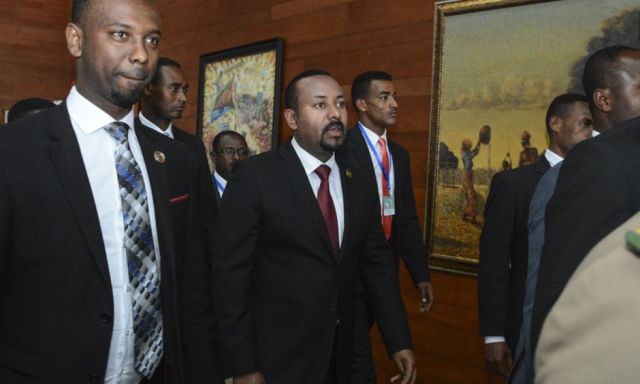
Ethiopia’s prime minister, Abiy Ahmed, centre, arrives at an African Union summit in Addis Ababa in July. Photograph: AP
By Jason Burke and Zecharias Zelalem in Addis Ababa
Sat 29 Aug 2020
Abiy Ahmed came to power promising radical reform, but 180 people have died amid ethnic unrest in Oromia state
Ethiopia faces a dangerous cycle of intensifying internal political dissent, ethnic unrest and security crackdowns, observers have warned, after a series of protests in recent weeks highlighted growing discontent with the government of Abiy Ahmed, a Nobel peace prize winner.
Many western powers welcomed the new approach of Abiy, who took power in 2018 and promised a programme of radical reform after decades of repressive one-party rule, hoping for swift changes in an emerging economic power that plays a key strategic role in a region increasingly contested by Middle Eastern powers and China. He won the peace prize in 2019 for ending a conflict with neighbouring Eritrea.
The most vocal unrest was in the state of Oromia, where there have been waves of protests since the killing last month of a popular Oromo artist and activist, Haacaaluu Hundeessaa, in Addis Ababa, the capital. An estimated 180 people have died in the violence, some murdered by mobs, others shot by security forces. Houses, factories, businesses, hotels, cars and government offices were set alight or damaged and several thousand people, including opposition leaders, were arrested.
Further protests last week prompted a new wave of repression and left at least 11 dead. “Oromia is still reeling from the grim weight of tragic killings this year. These grave patterns of abuse should never be allowed to continue,” said Aaron Maasho, a spokesperson for the Ethiopian Human Rights Commission.
—
Related:
‘How Dare We Not Vote?’ Black Voters Organize After DC March
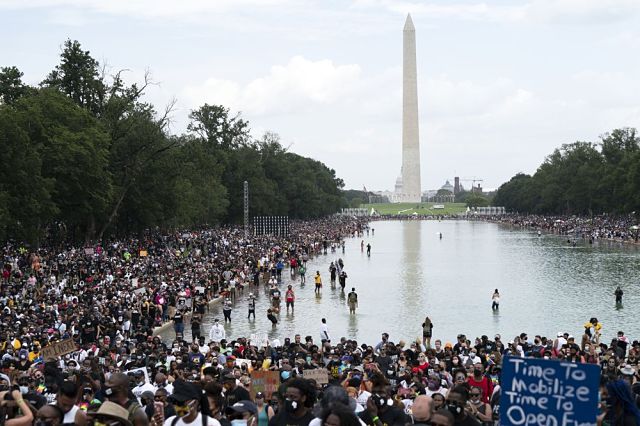
People rally at Lincoln Memorial during the March on Washington, Friday Aug. 28, 2020, on the 57th anniversary of the Rev. Martin Luther King Jr.’s “I Have A Dream” speech. Speakers implored attendees to “vote as if our lives depend on it.” (AP Photos)
The Associated Press
Updated: August 29th, 2020
WASHINGTON (AP) — Tears streamed down Brooke Moreland’s face as she watched tens of thousands gather on the steps of the Lincoln Memorial to decry systemic racism and demand racial justice in the wake of several police killings of Black Americans.
But for the Indianapolis mother of three, the fiery speeches delivered Friday at the commemoration of the 1963 March on Washington for Jobs and Freedom also gave way to one central message: Vote and demand change at the ballot box in November.
“As Black people, a lot of the people who look like us died for us to be able to sit in public, to vote, to go to school and to be able to walk around freely and live our lives,” the 31-year-old Moreland said. “Every election is an opportunity, so how dare we not vote after our ancestors fought for us to be here?”
That determination could prove critical in a presidential election where race is emerging as a flashpoint. President Donald Trump, at this past week’s Republican National Convention, emphasized a “law and order” message aimed at his largely white base of supporters. His Democratic rival, Joe Biden, has expressed empathy with Black victims of police brutality and is counting on strong turnout from African Americans to win critical states such as North Carolina, Florida, Pennsylvania and Michigan.
“If we do not vote in numbers that we’ve never ever seen before and allow this administration to continue what it is doing, we are headed on a course for serious destruction,” Martin Luther King III, told The Associated Press before his rousing remarks, delivered 57 years after his father’s famous “I Have A Dream” speech. “I’m going to do all that I can to encourage, promote, to mobilize and what’s at stake is the future of our nation, our planet. What’s at stake is the future of our children.”
As the campaign enters its latter stages, there’s an intensifying effort among African Americans to transform frustration over police brutality, systemic racism and the disproportionate toll of the coronavirus into political power. Organizers and participants said Friday’s march delivered a much needed rallying cry to mobilize.
As speakers implored attendees to “vote as if our lives depend on it,” the march came on the heels of yet another shooting by a white police officer of a Black man – 29-year-old Jacob Blake in Kenosha, Wisconsin, last Sunday — sparking demonstrations and violence that left two dead.
“We need a new conversation … you act like it’s no trouble to shoot us in the back,” the Rev. Al Sharpton said. “Our vote is dipped in blood. We’re going to vote for a nation that stops the George Floyds, that stops the Breonna Taylors.”
Navy veteran Alonzo Jones- Goss, who traveled to Washington from Boston, said he plans to vote for Biden because the nation has seen far too many tragic events that have claimed the lives of Black Americans and other people of color.
“I supported and defended the Constitution and I support the members that continue to do it today, but the injustice and the people that are losing their lives, that needs to end,” Jones-Goss, 28, said. “It’s been 57 years since Dr. King stood over there and delivered his speech. But what is unfortunate is what was happening 57 years ago is still happening today.”
Drawing comparisons to the original 1963 march, where participants then were protesting many of the same issues that have endured, National Urban League President and CEO Marc Morial said it’s clear why this year’s election will be pivotal for Black Americans.
“We are about reminding people and educating people on how important it is to translate the power of protest into the power of politics and public policy change,” said Morial, who spoke Friday. “So we want to be deliberate about making the connection between protesting and voting.”
Nadia Brown, a Purdue University political science professor, agreed there are similarities between the situation in 1963 and the issues that resonate among Black Americans today. She said the political pressure that was applied then led to the Voting Rights Act of 1965 and other powerful pieces of legislation that transformed the lives of African Americans. She’s hopeful this could happen again in November and beyond.
“There’s already a host of organizations that are mobilizing in the face of daunting things,” Brown said. “Bur these same groups that are most marginalized are saying it’s not enough to just vote, it’s not enough for the Democratic Party or the Republican Party to ask me for my vote. I’m going to hold these elected officials that are in office now accountable and I’m going to vote in November and hold those same people accountable. And for me, that is the most uplifting and rewarding part — to see those kind of similarities.”
But Brown noted that while Friday’s march resonated with many, it’s unclear whether it will translate into action among younger voters, whose lack of enthusiasm could become a vulnerability for Biden.
“I think there is already a momentum among younger folks who are saying not in my America, that this is not the place where they want to live, but will this turn into electoral gains? That I’m less clear on because a lot of the polling numbers show that pretty overwhelmingly, younger people, millennials and Gen Z’s are more progressive and that they are reluctantly turning to this pragmatic side of politics,” Brown said.
That was clear as the Movement for Black Lives also marked its own historic event Friday — a virtual Black National Convention that featured several speakers discussing pressing issues such as climate change, economic empowerment and the need for electoral justice.
“I don’t necessarily see elections as achieving justice per se because I view the existing system itself as being fundamentally unjust in many ways and it is the existing system that we are trying to fundamentally transform,” said Bree Newsome Bass, an activist and civil rights organizer, during the convention’s panel about electoral justice. “I do think voting and recognizing what an election should be is a way to kind of exercise that muscle.”
—
Biden, Harris Prepare to Travel More as Campaign Heats Up (Election Update)
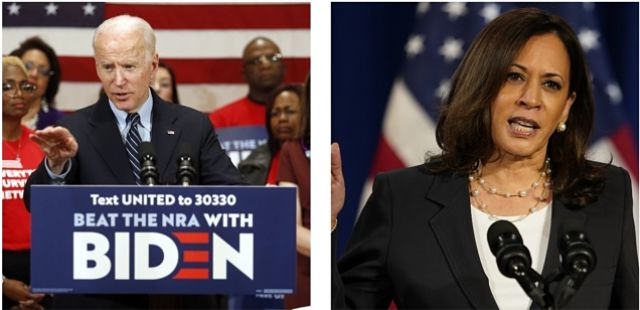
Democratic presidential candidate, former Vice President Joe Biden and vice presidential candidate Sen. Kamala Harris. (AP Photos)
The Associated Press
August 28th, 2020
WASHINGTON (AP) — After spending a pandemic spring and summer tethered almost entirely to his Delaware home, Joe Biden plans to take his presidential campaign to battleground states after Labor Day in his bid to unseat President Donald Trump.
No itinerary is set, according to the Democratic nominee’s campaign, but the former vice president and his allies say his plan is to highlight contrasts with Trump, from policy arguments tailored to specific audiences to the strict public health guidelines the Biden campaign says its events will follow amid COVID-19.
That’s a notable difference from a president who on Thursday delivered his nomination acceptance on the White House lawn to more than 1,000 people seated side-by-side, most of them without masks, even as the U.S. death toll surpassed 180,000.
“He will go wherever he needs to go,” said Biden’s campaign co-chairman Cedric Richmond, a Louisiana congressman. “And we will do it in a way the health experts would be happy” with and “not the absolutely irresponsible manner you saw at the White House.”
Richmond said it was “always the plan” for Biden and his running mate Kamala Harris to travel more extensively after Labor Day, the traditional mark of the campaign’s home stretch when more casual voters begin to pay close attention.
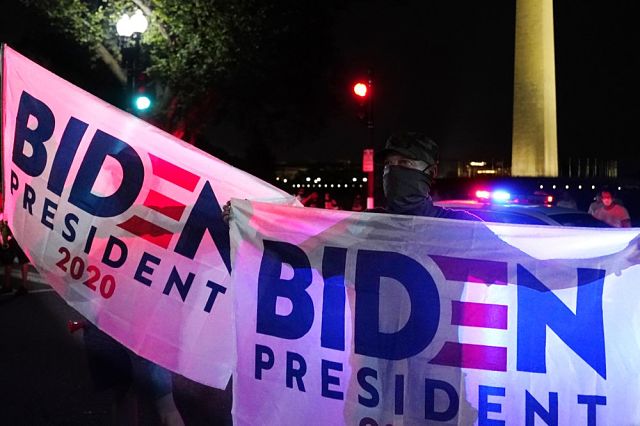
Biden supporters hold banners near the White House on the fourth day of the Republican National Convention, Thursday evening, Aug. 27, 2020, in Washington, while Donald Trump delivers his acceptance speech from the nearby White House South Lawn.(AP Photo)
Biden has conducted online fundraisers, campaign events and television interviews from his home, but traveled only sparingly for speeches and roundtables with a smattering of media or supporters. His only confirmed plane travel was to Houston, where he met with the family of George Floyd, the Black man who was killed by a white Minneapolis police officer on May 25, sparking nationwide protests. Even some Democrats worried quietly that Biden was ceding too much of the spotlight to Trump. But Biden aides have defended their approach. “We will never make any choices that put our staff or voters in harm’s way,” campaign manager Jen O’Malley Dillon said in May.
Throughout his unusual home-based campaign, Biden blasted Trump as incompetent and irresponsible for downplaying the pandemic and publicly disputing the government’s infectious disease experts. Richmond said that won’t change as Biden ramps up travel.
“We won’t beat this pandemic, which means we can’t restore the economy and get people’s lives back home, unless we exercise some discipline and lead by example,” Richmond said, adding that Trump is “incapable of doing it.”
As exhibited by his acceptance speech Thursday, Trump is insistent on as much normalcy as possible, even as he’s pulled back from his signature indoor rallies after drawing a disappointing crowd in Tulsa, Oklahoma on June 20. Trump casts Biden as wanting to “shut down” the economy to combat the virus. “Joe Biden’s plan is not a solution to the virus, but rather a surrender,” Trump declared on the White House lawn. Biden, in fact, has not proposed shutting down the economy. He’s said only that he would be willing to make such a move as president if public health experts advise it. The Democrat also has called for a national mask mandate, calling it a necessary move for Americans to protect each other. Harris on Friday talked about the idea in slightly different terms than Biden, acknowledging that a mandate would be difficult to enforce.
“It’s really a standard. I mean, nobody’s gonna be punished. Come on,” the California senator said, laughing off a question about how to enforce such a rule during an interview that aired Friday on “Today.” “Nobody likes to wear a mask. This is a universal feeling. Right? So that’s not the point, ’Hey, let’s enjoy wearing masks.′ No.”
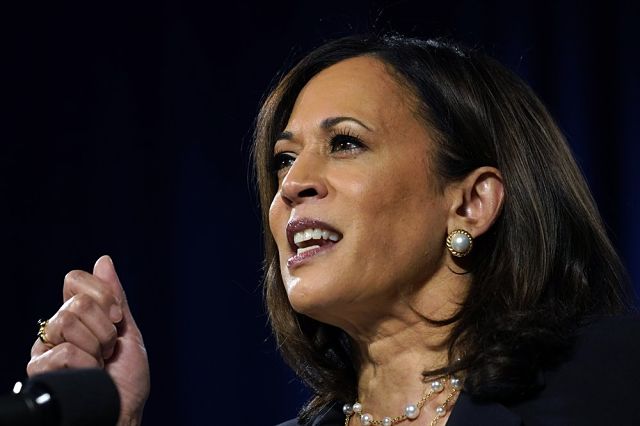
Democratic vice presidential candidate Sen. Kamala Harris, D-Calif., speaks in Washington, Thursday, Aug. 27, 2020. (AP Photo)
Harris suggested that, instead, the rule would be about “what we — as responsible people who love our neighbor — we have to just do that right now.”
“God willing, it won’t be forever,” she added.
Biden and Harris have worn protective face masks in public and stayed socially distanced from each other when appearing together at campaign events. Both have said for weeks that a rule requiring all Americans to wear them could save 40,000 lives in just a three-month period. While such an order may be difficult to impose at the federal level, Biden has called on every governor in the country to order mask-wearing in their states, which would likely achieve the same goal.
Trump has urged Americans to wear masks but opposes a national requirement and personally declined to do so for months. He has worn a mask occasionally more recently, but not at any point Thursday at the Republican National Convention’s closing event, which violated the District of Columbia’s guidelines prohibiting large gatherings.
—
Related:
Joe Biden Claims the Democratic Presidential Nomination
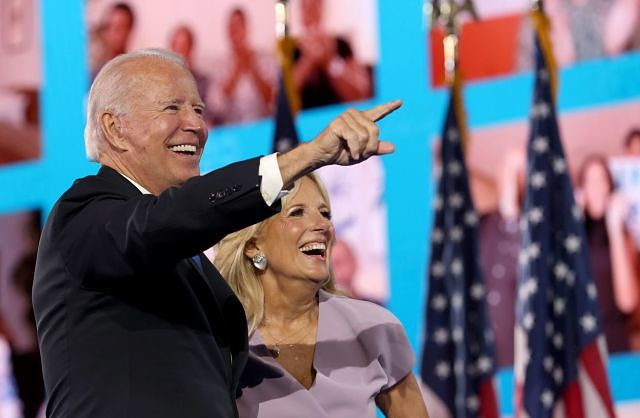
Former U.S. Vice President Joe Biden accepted the 2020 Democratic presidential nomination on Thursday evening during the last day of the historic Democratic National Convention, August 20, 2020. (AP photo)
The Washington Post
Updated: August 21st, 2020
Biden speaks about ‘battle for the soul of this nation,’ decries Trump’s leadership
Joe Biden accepted his party’s presidential nomination, delivering a speech that directly criticized the leadership of Trump on matters of the coronavirus pandemic, the economy and racial justice.
“Here and now, I give you my word: If you entrust me with the presidency, I will draw on the best of us, not the worst. I’ll be an ally of the light, not the darkness,” Biden said, calling on Americans to come together to “overcome this season of darkness.”
The night featured tributes to civil rights activist and congressman John Lewis, who died in July, as well as to Beau Biden, Joe Biden’s son who died in 2015.
—
Kamala Harris Accepts Historic Nomination for Vice President of the United States
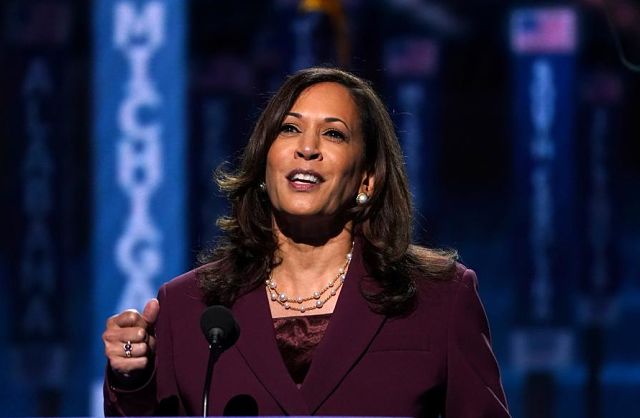
Sen. Kamala D. Harris (D-Calif.) accepted her party’s historic nomination to be its vice-presidential candidate in the 2020 U.S. election on Wednesday evening during the third day of the Democratic National Convention. (Reuters photo)
Reuters
Updated: August 20th, 2020
Kamala Harris makes U.S. history, accepts Democrats’ vice presidential nod
WASHINGTON (Reuters) – U.S. Senator Kamala Harris accepted the Democratic nomination for vice president on Wednesday, imploring the country to elect Joe Biden president and accusing Donald Trump of failed leadership that had cost lives and livelihoods.
The first Black woman and Asian-American on a major U.S. presidential ticket, Harris summarized her life story as emblematic of the American dream on the third day of the Democratic National Convention.
“Donald Trump’s failure of leadership has cost lives and livelihoods,” Harris said.
Former U.S. President Barack Obama told the convention Trump’s failures as his successor had led to 170,000 people dead from the coronavirus, millions of lost jobs and America’s reputation badly diminished in the world.
The evening featured a crush of women headliners, moderators and speakers, with Harris pressing the case against Trump, speaking directly to millions of women, young Americans and voters of color, constituencies Democrats need if Biden is to defeat the Republican Trump.
“The constant chaos leaves us adrift, the incompetence makes us feel afraid, the callousness makes us feel alone. It’s a lot. And here’s the thing: we can do better and deserve so much more,” she said.
“Right now, we have a president who turns our tragedies into political weapons. Joe will be a president who turns our challenges into purpose,” she said, speaking from an austere hotel ballroom in Biden’s hometown of Wilmington, Delaware.
Biden leads Trump in opinion polls ahead of the Nov. 3 election, bolstered by a big lead among women voters. Throughout the convention, Democrats have appealed directly to those women voters, highlighting Biden’s co-sponsorship of the landmark Violence Against Woman Act of 1994 and his proposals to bolster childcare and protect family healthcare provisions.
Obama, whose vice president was Biden from 2009-2017, said he had hoped that Trump would take the job seriously, come to feel the weight of the office, and discover a reverence for American democracy.
Obama on Trump: ‘Trump hasn’t grown into the job because he can’t’
“Donald Trump hasn’t grown into the job because he can’t. And the consequences of that failure are severe,” Obama said in unusually blunt criticism from an ex-president.
“Millions of jobs gone. Our worst impulses unleashed, our proud reputation around the world badly diminished, and our democratic institutions threatened like never before,” Obama said.
The choice of a running mate has added significance for Biden, 77, who would be the oldest person to become president if he is elected. His age has led to speculation he will serve only one term, making Harris a potential top contender for the nomination in 2024.
Biden named Harris, 55, as his running mate last week to face incumbents Trump, 74, and Vice President Mike Pence, 61.
Former first lady and U.S. Secretary of State Hillary Clinton, the 2016 Democratic presidential nominee who lost to Trump, told the convention she constantly hears from voters who regret backing Trump or not voting at all.
“This can’t be another woulda coulda shoulda election.” Clinton said. “No matter what, vote. Vote like our lives and livelihoods are on the line, because they are.”
Clinton, who won the popular vote against Trump but lost in the Electoral College, said Biden needs to win overwhelmingly, warning he could win the popular vote but still lose the White House.
“Joe and Kamala can win by 3 million votes and still lose,” Clinton said. “Take it from me. So we need numbers overwhelming so Trump can’t sneak or steal his way to victory.”
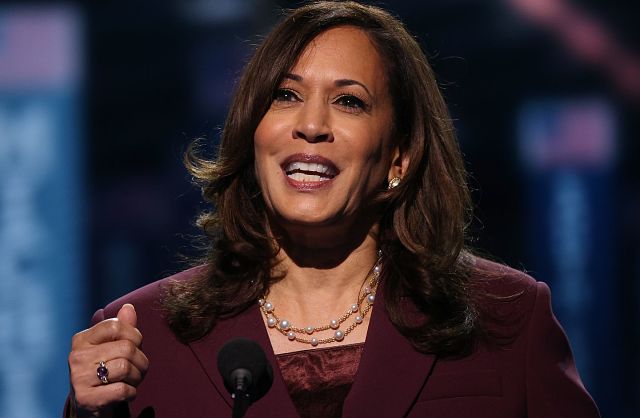
U.S. Senator Kamala Harris (D-CA) accepts the Democratic vice presidential nomination during an acceptance speech delivered for 2020 Democratic National Convention from the Chase Center in Wilmington, Delaware, U.S., August 19, 2020. (Getty Images)
Democrats have been alarmed by Trump’s frequent criticism of mail-in voting, and by cost-cutting changes at the U.S. Postal Service instituted by Postmaster General Louis DeJoy, a Trump supporter, that could delay mail during the election crunch. DeJoy said recently he would delay those changes until after the election.
Democrats also broadcast videos highlighting Trump’s crackdown on immigration, opposition to gun restrictions and his decision to pull out of the Paris climate accord.
‘DISRESPECT’ FOR FACTS, FOR WOMEN
Nancy Pelosi, the first woman Speaker of the U.S. House of Representatives, told the convention she had seen firsthand Trump’s “disrespect for facts, for working families, and for women in particular – disrespect written into his policies toward our health and our rights, not just his conduct. But we know what he doesn’t: that when women succeed, America succeeds.”
U.S. Senator Elizabeth Warren, a leading progressive who ran against Biden in the 2020 primary, spoke to the convention from a childcare center in Massachusetts and cited Biden’s proposal to make childcare more affordable as a vital part of his agenda to help working Americans.
“It’s time to recognize that childcare is part of the basic infrastructure of this nation — it’s infrastructure for families,” she said. “Joe and Kamala will make high-quality childcare affordable for every family, make preschool universal, and raise the wages for every childcare worker.”
In her speech later, Harris will have an opportunity to outline her background as a child of immigrants from India and Jamaica who as a district attorney, state attorney general, U.S. senator from California and now vice-presidential candidate shattered gender and racial barriers.
She gained prominence in the Senate for her exacting interrogations of Trump nominees, Supreme Court Justice Brett Kavanaugh and Attorney General Bill Barr.
The Republican National Convention, also largely virtual, takes place next week.
—
Democrats Officially Nominate Joe Biden to Become the Next U.S. President
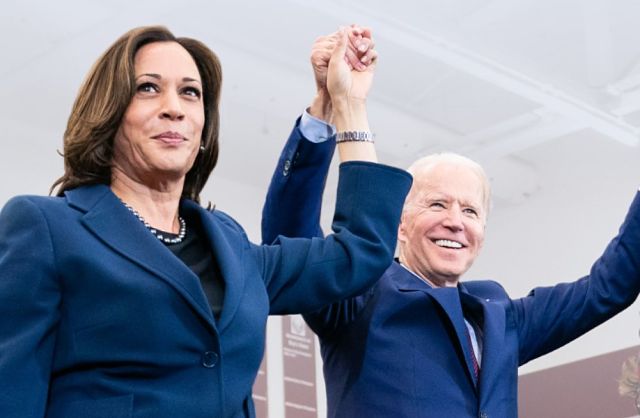
It’s official: Joe Biden is now formally a candidate to become the next President of the United States. Democrats officially nominated Biden as their 2020 candidate on Tuesday with a roll-call vote of delegates representing all states in the country during the second day of party’s historic virtual convention. (Photo: Courtesy of the Biden campaign)
The Associated Press
Updated: August 19th, 2020
Democrats make it official, nominate Biden to take on Trump
NEW YORK (AP) — Democrats formally nominated Joe Biden as their 2020 presidential nominee Tuesday night, as party officials and activists from across the nation gave the former vice president their overwhelming support during his party’s all-virtual national convention.
The moment marked a political high point for Biden, who had sought the presidency twice before and is now cemented as the embodiment of Democrats’ desperate desire to defeat President Donald Trump this fall.
The roll call of convention delegates formalized what has been clear for months since Biden took the lead in the primary elections’ chase for the nomination. It came as he worked to demonstrate the breadth of his coalition for a second consecutive night, this time blending support from his party’s elders and fresher faces to make the case that he has the experience and energy to repair chaos that Trump has created at home and abroad.
Former President Bill Clinton and former Secretary of State John Kerry — and former Republican Secretary of State Colin Powell — were among the heavy hitters on a schedule that emphasized a simple theme: Leadership matters. Former President Jimmy Carter, now 95 years old, also made an appearance.
“Donald Trump says we’re leading the world. Well, we are the only major industrial economy to have its unemployment rate triple,” Clinton said. “At a time like this, the Oval Office should be a command center. Instead, it’s a storm center. There’s only chaos.”

In this image from video, former Georgia House Democratic leader Stacey Abrams, center, and others, speak during the second night of the Democratic National Convention on Tuesday, Aug. 18, 2020. (Democratic National Convention via AP)
Biden formally captured his party’s presidential nomination Tuesday night after being nominated by three people, including two Delaware lawmakers and 31-year-old African American security guard who became a viral sensation after blurting out “I love you” to Biden in a New York City elevator.
Delegates from across the country then pledged their support for Biden in a video montage that featured Democrats in places like Alabama’s Edmund Pettis Bridge, a beach in Hawaii and the headwaters of the Mississippi River.
In the opening of the convention’s second night, a collection of younger Democrats, including former Georgia lawmaker Stacey Abrams and New York Rep. Alexandria Ocasio-Cortez, were given a few minutes to shine.
“In a democracy, we do not elect saviors. We cast our ballots for those who see our struggles and pledge to serve,” said Abrams, 46, who emerged as a national player during her unsuccessful bid for governor in 2018 and was among those considered to be Biden’s running mate.
She added: “Faced with a president of cowardice, Joe Biden is a man of proven courage.”
On a night that Biden was formally receiving his party’s presidential nomination, the convention was also introducing his wife, Jill Biden, to the nation as the prospective first lady.

In this image from video, Democratic presidential candidate former Vice President Joe Biden, his wife Jill Biden, and members of the Biden family, celebrate after the roll call during the second night of the Democratic National Convention on Tuesday, Aug. 18, 2020. (Democratic National Convention via AP)
Biden is fighting unprecedented logistical challenges to deliver his message during an all-virtual convention this week as the coronavirus epidemic continues to claim hundreds of American lives each day and wreaks havoc on the economy.
The former vice president was becoming his party’s nominee as a prerecorded roll call vote from delegates in all 50 states airs, and the four-day convention will culminate on Thursday when he accepts that nomination. His running mate, California Sen. Kamala Harris, will become the first woman of color to accept a major party’s vice presidential nomination on Wednesday.
Until then, Biden is presenting what he sees as the best of his sprawling coalition to the American electorate in a format unlike any other in history.
For a second night, the Democrats featured Republicans.
Powell, who served as secretary of state under George W. Bush and appeared at multiple Republican conventions in years past, was endorsing the Democratic candidate. In a video released ahead of his speech, he said, “Our country needs a commander in chief who takes care of our troops in the same way he would his own family. For Joe Biden, that doesn’t need teaching.”
Powell joins the widow of the late Arizona Sen. John McCain, Cindy McCain, who was expected to stop short of a formal endorsement but talk about the mutual respect and friendship her husband and Biden shared.
While there have been individual members of the opposing party featured at presidential conventions before, a half dozen Republicans, including the former two-term governor of Ohio, have now spoken for Democrat Biden.
No one on the program Tuesday night has a stronger connection to the Democratic nominee than his wife, Jill Biden, a longtime teacher, was speaking from her former classroom at Brandywine High School near the family home in Wilmington, Delaware.
“You can hear the anxiety that echoes down empty hallways. There’s no scent of new notebooks or freshly waxed floors,” she said of the school in excerpts of her speech before turning to the nation’s challenges at home. “How do you make a broken family whole? The same way you make a nation whole. With love and understanding—and with small acts of compassion. With bravery. With unwavering faith.”
The Democrats’ party elders played a prominent role throughout the night.
Clinton, who turns 74 on Tuesday, hasn’t held office in two decades. Kerry, 76, was the Democratic presidential nominee back in 2004 when the youngest voters this fall were still in diapers. And Carter is 95 years old.
Clinton, a fixture of Democratic conventions for nearly three decades, addressed voters for roughly five minutes in a speech recorded at his home in Chappaqua, New York.
In addition to railing against Trump’s leadership, Clinton calls Biden “a go-to-work president.” Biden, Clinton continued, is “a man with a mission: to take responsibility, not shift the blame; concentrate, not distract; unite, not divide.”…
Kerry said in an excerpt of his remarks, “Joe understands that none of the issues of this world — not nuclear weapons, not the challenge of building back better after COVID, not terrorism and certainly not the climate crisis — none can be resolved without bringing nations together.”
—
Democrats Kick Off Convention as Poll Show Biden, Harris With Double-Digit Lead
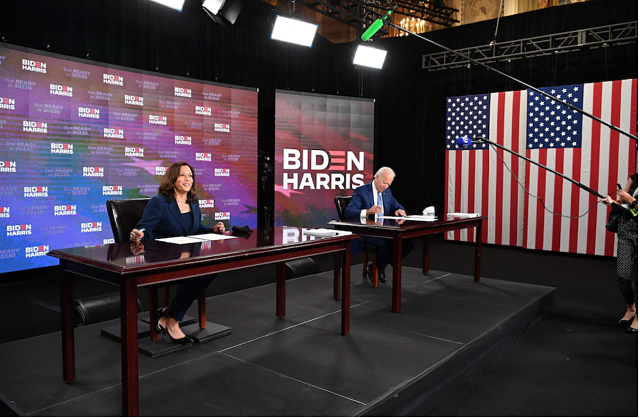
Democrats kicked off their historic virtual convention on Monday with the keynote speaker former first lady Michelle Obama assailing the current president as unfit and warning Americans not to reelect him for a second term. Meanwhile new poll show Biden, Harris with double-digit lead over Trump. (Getty Images)
The Associated Press
Updated: August 18th, 2020
Michelle Obama assails Trump as Democrats open convention
NEW YORK (AP) — Michelle Obama delivered a passionate broadside against President Donald Trump during Monday’s opening night of the Democratic National Convention, assailing the Republican president as unfit for the job and warning that the nation’s mounting crises would only get worse if he’s reelected.
The former first lady issued an emotional call to the coalition that sent her husband to the White House, declaring that strong feelings must be translated into votes.
“Donald Trump is the wrong president for our country,” she declared. “He has had more than enough time to prove that he can do the job, but he is clearly in over his head. He cannot meet this moment. He simply cannot be who we need him to be for us.”
Obama added: “If you think things possibly can’t get worse, trust me, they can and they will if we don’t make a change in this election.”
The comments came as Joe Biden introduced the breadth of his political coalition to a nation in crisis Monday night at the convention, giving voice to victims of the coronavirus pandemic, the related economic downturn and police violence and featuring both progressive Democrats and Republicans united against Trump’s reelection.
Former first lady Michelle Obama speaks during the first night of the Democratic National Convention on Monday, Aug. 17, 2020. The DNC released excerpts of her speech ahead of the convention start. (Democratic National Convention)
The ideological range of Biden’s many messengers was demonstrated by former presidential contenders from opposing parties: Vermont Sen. Bernie Sanders, a self-described democratic socialist who championed a multi-trillion-dollar universal health care plan, and Ohio’s former Republican Gov. John Kasich, an anti-abortion conservative who spent decades fighting to cut government spending.
The former vice president won’t deliver his formal remarks until Thursday night, but he made his first appearance just half an hour into Monday’s event as he moderated a panel on racial justice, a theme throughout the night, as was concern about the Postal Service. The Democrats accuse Trump of interfering with the nation’s mail in order to throw blocks in front of mail-in voting.
“My friends, I say to you, and to everyone who supported other candidates in this primary and to those who may have voted for Donald Trump in the last election: The future of our democracy is at stake. The future of our economy is at stake. The future of our planet is at stake,” Sanders declared.
Kasich said his status as a lifelong Republican “holds second place to my responsibility to my country.”
“In normal times, something like this would probably never happen, but these are not normal times,” he said of his participation at the Democrats’ convention. He added: “Many of us can’t imagine four more years going down this path.”
—
Post-ABC poll shows Biden, Harris hold double-digit lead over Trump, Pence
The race for the White House tilts toward the Democrats, with former vice president Joe Biden holding a double-digit lead nationally over President Trump amid continuing disapproval of the president’s handling of the coronavirus pandemic, according to a Washington Post-ABC News poll.
Democrats [kicked] off their convention on Monday in a mood of cautious optimism, with Biden and his running mate, Sen. Kamala D. Harris (D-Calif.), leading Trump and Vice President Pence by 53 percent to 41 percent among registered voters. The findings are identical among a larger sample of all voting-age adults.
Biden’s current national margin over Trump among voters is slightly smaller than the 15-point margin in a poll taken last month and slightly larger than a survey in May when he led by 10 points. In late March, as the pandemic was taking hold in the United States, Biden and Trump were separated by just two points, with the former vice president holding a statistically insignificant advantage.
Today, Biden and Harris lead by 54 percent to 43 percent among those who say they are absolutely certain to vote and who also report voting in 2016. A month ago, Biden’s lead of 15 points overall had narrowed to seven points among similarly committed 2016 voters. Biden now also leads by low double-digits among those who say they are following the election most closely.
—
Team Joe Announces Convention Speakers
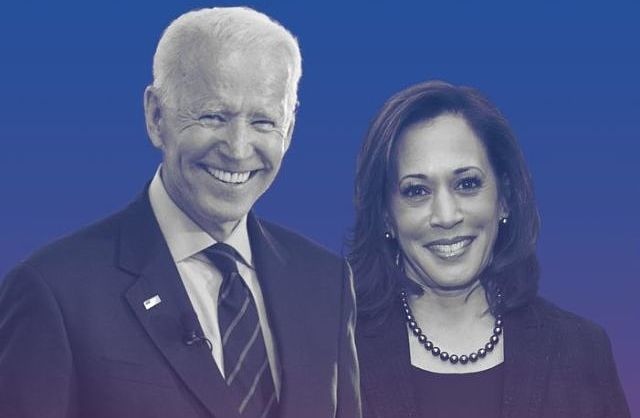
Joe Biden, the presumptive Democratic presidential nominee, and his running mate, US Senator Kamala Harris. (Courtesy Photo)
Tadias Magazine
By Tadias Staff
Updated: August 17th, 2020
New York (TADIAS) — Joe Biden’s campaign has announced its speaker lineup for the Democratic National Convention that’s set to open on Monday, August 17th in Milwaukee, Wisconsin.
Below are the list of speakers that will be featured “across all four nights of the Convention which will air live August 17-20 from 9:00-11:00 PM Eastern each night.”
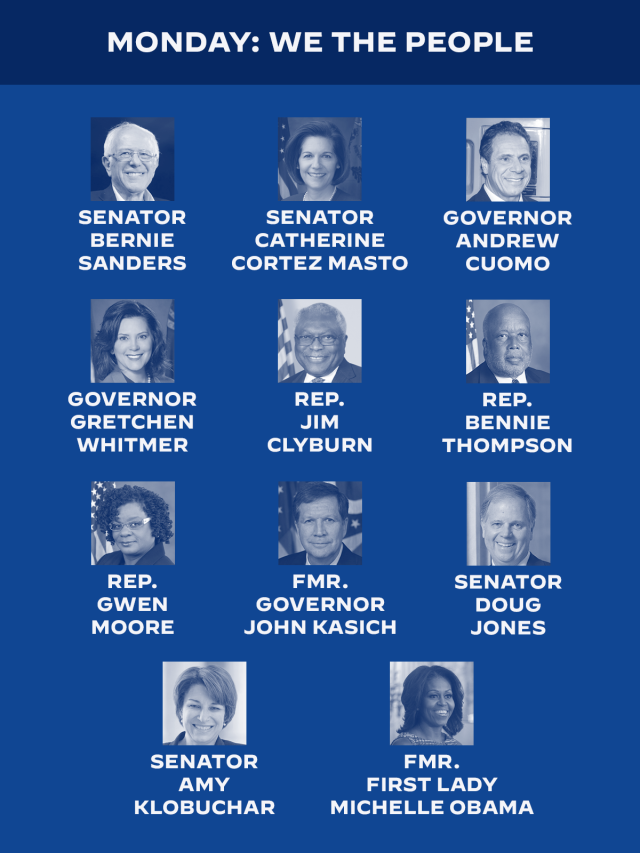
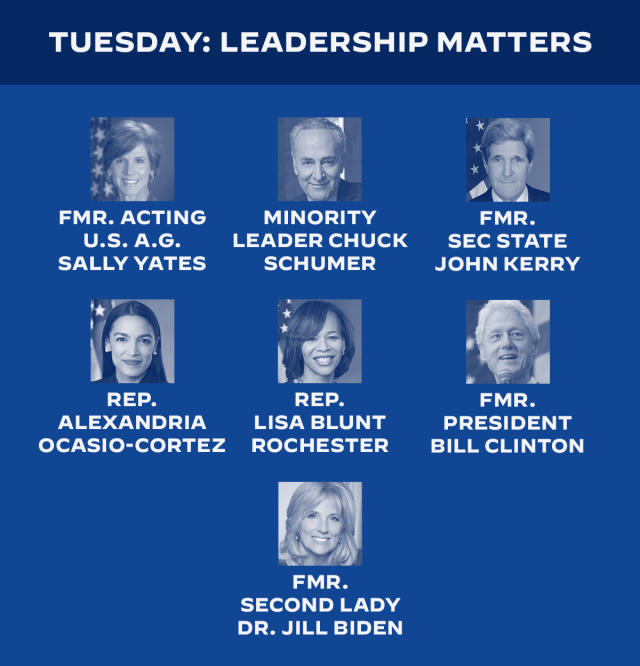
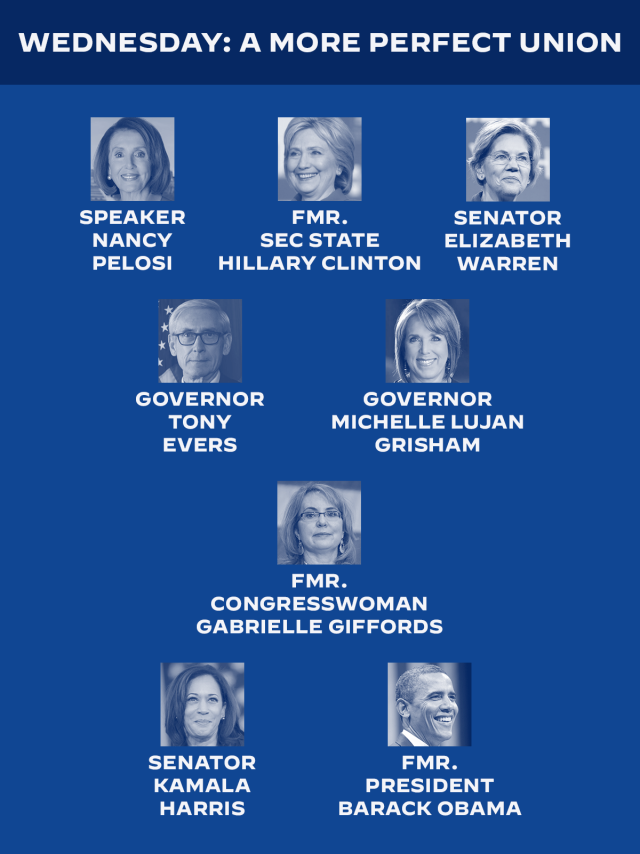
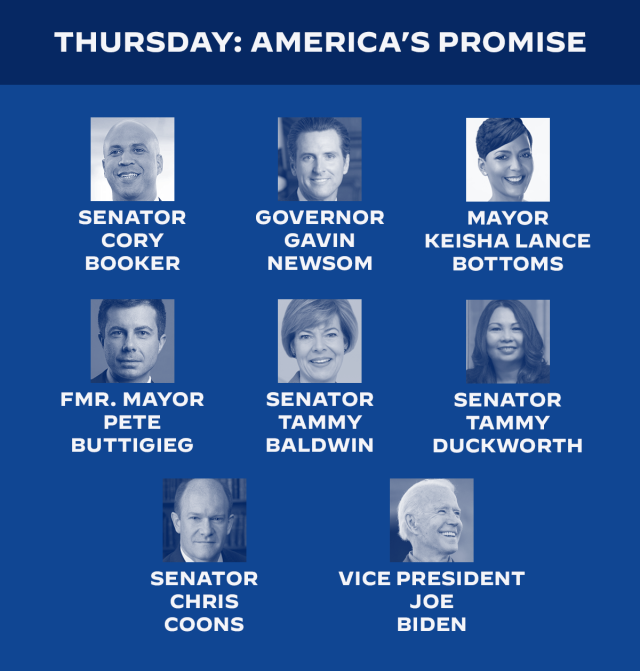
—
Related:
‘ሴቷ ኦባማ?’: Kamala Harris Faces Culture of Sexism & Misogyny in Ethiopian Media
Interview With Addisu Demissie: Senior Adviser to Joe Biden
Biden Selects Yohannes Abraham as Member of Transition Team
—
